Nov 2015 1st Edition
Nov 2015 1st Edition Estelle Greeff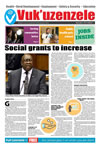
Translations
Social grants to increase
Social grants to increase Estelle GreeffGovernment has announced a number of measures from the national purse aimed at advancing development in communities while providing a social security net for many.
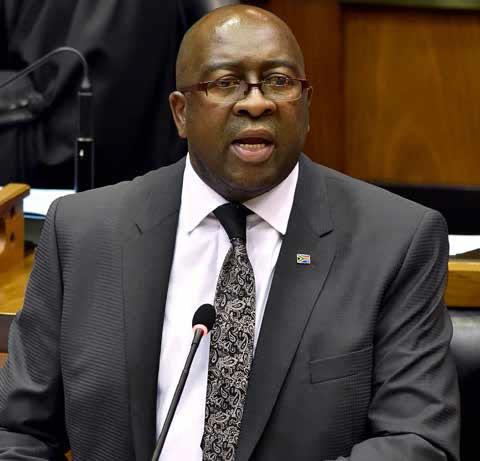 Finance Minister Nhlanhla Nene tabled his Medium Term Budget Policy Statement in Parliament recently, and announced that National Treasury had increased social grants by R10 to bring it in line with long-term inflation.
Finance Minister Nhlanhla Nene tabled his Medium Term Budget Policy Statement in Parliament recently, and announced that National Treasury had increased social grants by R10 to bring it in line with long-term inflation.
The Minister said the increase is part of government’s overall spending priorities, adding that government’s social assistance programme is central to the relief of poverty and vulnerability.
“Approximately 16.7 million South Africans receive social grants currently. With effect from this month [October], the old-age, war veterans, disability and care dependency grants are increased by R10, to bring the annual increase in line with long-term inflation,” he said.
Over the spending period ahead, nearly R13 billion will be added to social assistance budgets to accommodate the increase in
beneficiaries and ensure that the value of grants keeps pace with inflation.
According to National Treasury, the number of beneficiaries of social grants is projected to reach 18.1 million in 2018/19, growing at 2.2 per cent a year over the next three years.
This is mainly due to higher life expectancy and efforts to ensure all eligible children younger than two years of age benefit from the grant, National Treasury added.
Due to rising electricity prices and population growth, additional pressure has been put on the ability of municipalities to fund free basic services for low-income households, it said.
National government proposed adding R6 billion to the local government equitable share to offset these trends.
Funding for priorities
 Minister Nene said government spending is set to grow above inflation over the next three years to fund government priorities.
Minister Nene said government spending is set to grow above inflation over the next three years to fund government priorities.
Education and skills development will take the lion’s share of this year’s spending, and will grow by 7.2 per cent, he added.
Resources will be added to health expenditure to further strengthen government’s response to HIV and AIDS, as well as interventions to tackle the scourge of TB.
“Government proposes to allocate R313 billion to capital spending and housing over the next three years, with about R165 billion allocated to community infrastructure.
“Another R229 billion will be transferred to municipalities for infrastructure projects,” he said.
The National Development Plan stresses the importance of quality education to reduce poverty and inequality.
While government spends about 15 per cent of its budget on basic education, the quality of outputs does not match the extent of the investment. Learner performance improved in the 2014 Annual National Assessments and international benchmark assessments, for example, but is still below acceptable levels.
To improve basic education, the Minister said over the next three years government would expand the provision of learner and teacher support materials, including workbooks to over 10 million learners each year.
The targeted support programmes will help teachers improve instruction in maths, science and technology through an intensive in-service training programme, National Treasury said in its budget documents.
Support for Early Childhood Development centres
 Government is planning to increase the number of children subsidised at Early Childhood Development (ECD) centres by 127 000.
Government is planning to increase the number of children subsidised at Early Childhood Development (ECD) centres by 127 000.
Funding is also being considered for minor facilities upgrades at about 4 000 ECD sites.
“Universal access to Grade R is expected to be achieved within the next three years. In line with recommendations of the Department of Planning, Monitoring and Evaluation, the qualifications of Grade R practitioners will be upgraded to ensure that quality improves.
“A well-developed ECD system enhances educational outcomes. Of the 1.35 million children enrolled in this system, half are subsidised. Government aims to provide all qualifying children in registered centres with an ECD subsidy,” said National Treasury.
Government has also allocated billions of rands to programmes that will support businesses, competitiveness and skills and development.
Minister Nene said government would allocate R37 billion over the next three years to public employment programmes.
“This will allow the Expanded Pubic Works Programme to create about six million short-term jobs,” he added.
Minister Nene said that by 2017, the Community Work Programme will exist in every municipality.
Higher education
The Minister noted the challenges in financing the expansion of further education and university opportunities but stressed that the disruption of learning was not constructive.
He added that there was a need to strengthen student financing further and find solutions where current arrangements were inadequate.
More money for rural areas
 In its budget documents, National Treasury said government is committed to investing in rural infrastructure to eradicate backlogs in access to services, increase mobility and create opportunities to grow local economies.
In its budget documents, National Treasury said government is committed to investing in rural infrastructure to eradicate backlogs in access to services, increase mobility and create opportunities to grow local economies.
The majority of municipal infrastructure grants for services such as water, sanitation, electricity and roads are allocated to the 27 priority rural district municipalities, National Treasury said.
The bulk of provincial grants for upgrading schools and building clinics are also allocated to rural areas.
“While all municipalities require capacity support, the need is most pressing in rural municipalities. To provide support to these areas, the municipal systems improvement grant will be refocused as an indirect grant, helping to build well-governed, capable municipal institutions as set out in the Back to Basics strategy,” it added.
N2 Gateway project provides new homes
N2 Gateway project provides new homes Estelle GreeffWhen President Jacob Zuma handed over a new house to Rachel Manyi, the Kwa-Langa resident – who could not contain her joy – said she had not been given a house, but a home.
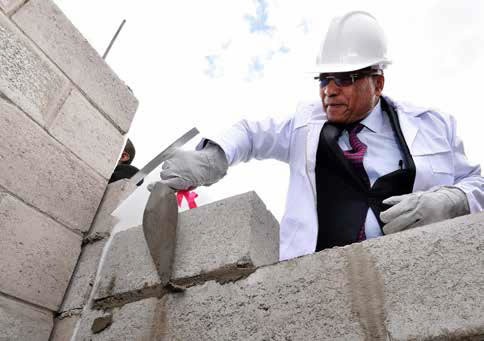 “This is a very good day. The wait is over,” she said.
“This is a very good day. The wait is over,” she said.
Manyi is one of several beneficiaries who were handed over new homes when President Zuma recently opened the N2 Gateway Integrated Human Settlements Development project in the Western Cape.
The national priority project is designed to address poverty, destitution and homelessness through the elimination of informal settlements.
The President said prior to the launch of the project, housing in the area was not adequate and residents had lived in squalor.
“Government took the decision to improve this place because we realised the hardships that our people faced.
“We wanted to ensure that the N2 Gateway project becomes an important intervention for the national housing initiative. We also realised that in order cater for the needs of the residents of the city, there had to be a change of gear and approach in the way of doing things,” he said.
The N2 Gateway project
- More than R2 billion spent on services and infrastructure.
- 14 000 houses delivered.
- More than 70 000 people have been accommodated.
The President added that government wanted to ensure that the N2 Gateway project not only created housing opportunities, but formed part of an overall strategy to provide other facilities like schools and clinics, as well as correcting apartheid spatial planning by bringing people closer to their workplaces.
Improving quality of life
When President Zuma handed over the houses, he said the human settlements would improve the quality of life of the beneficiaries.
The project, which was approved by Cabinet in 2004, was first rolled out as a pilot project under the Breaking New Ground (BNG) policy and meant to deliver about 20 000 mixed income units.
To date, the project has delivered over 14 000 houses.
The main aim of the pilot project by the Department of Human Settlements is to provide low-cost human settlements that would restore the dignity of locals.
As part of the project 8 000 units are to be completed by 2019.
More than 70 000 people have been accommodated at the project, with more than R2 billion spent on services and infrastructure.
Outstanding Achievement
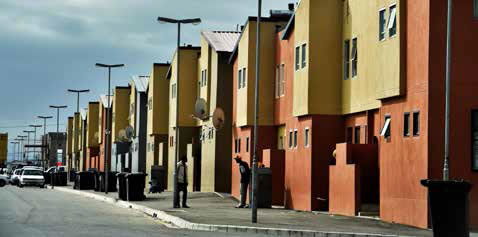 The President said over 12 million South Africans have benefitted from the 3.8 million houses and serviced sites provided by the democratic government since 1994.
The President said over 12 million South Africans have benefitted from the 3.8 million houses and serviced sites provided by the democratic government since 1994.
“Very soon, we will reach the four million mark in terms of the houses that we have provided, and this is an outstanding achievement given all the odds that we faced since assuming government.
“The national government will also continue with the monitoring and evaluation systems on all our projects to ensure that our people get quality delivery,” he said.
The President added that projects of a similar magnitude to the Western Cape’s Joe Slovo intervention were being rolled out in other parts of the country.
This included projects in Cornubia in eThekwini in KwaZulu-Natal, as well as in Zanemvula in the Nelson Mandela Metropolitan in Eastern Cape.
The Cornubia development is located over 1 300 hectares of land connecting the King Shaka International Airport and Umhlanga area.
It is envisaged that it will deliver close to 30 000 housing units and provide shelter to over 100 000 people.
It is expected that the project will cost not more than R25 billion.
The project was also approved by the Cabinet as part of the BNG policy and was launched as a national presidential project in 2008.
The President said government was also rolling out a similar project in Lerato Park in Kimberly in the Northern Cape as well as in Fleurhof, Lufhereng and Cosmo City in Gauteng.
Over 12 million South Africans have benefitted from the 3.8 million houses delivered since 1994.
News in Brief - Nov 1st Ed
News in Brief - Nov 1st Ed Estelle GreeffChina to build 100 health facilities in Africa
The Chinese government has committed to building 100 health facilities in Africa.
China’s Health Minister Li Bin, along with South Africa’s Health Minister Aaron Motsoaledi, made the announcement in Cape Town recently following the second ministerial forum of the China-Africa Health Development meeting.
Minister Li said China would also continue to send medical teams to work in African countries and recruit some 1 500 medical personnel over the next three years.
The two countries have committed to improving the health systems of African countries in the post-Ebola era, reinforcing laboratory capacity and diagnostic systems, assisting with human resources development in Africa, and improving health infrastructure.
China will also provide scholarships and training courses to public health professionals in Africa, while both sides have agreed to expand their information exchanges and cooperation with regard to major diseases.
Minister Motsoaledi said the building of the 100 health facilities would go a long way in helping to strengthen the continent's resources.
“We regard the whole issue of Ebola which happened in Africa as ground zero. It exposed us as a continent, that we have health care systems that are not strong. Now we are not preparing for Ebola only, but [the] strengthening of the health care system”.
Gauteng announces new department
The Gauteng Provincial Government has established a new department - the Department of e-Government - in an effort to improve service delivery, modernise the public service and stimulate the province’s knowledge-based economy.
This new department is mandated to implement the e-Government Strategy of the Gauteng City Region, which seeks to, among other things, consolidate back-end systems and processes to bring about better front-line service delivery to the people.
“The e-Government Department will oversee the rollout of the Gauteng Broadband Network, which will connect all government buildings and various public service access points, including Thusong Centres, urban renewal zones and targeted economic zones,” said the provincial government.
The Department of Finance, which was previously responsible for the functions of procurement, payments, forensic auditing, transversal human resources management and ICT, has been disestablished.
“The ICT functions will be performed by the new e-Government Department while the rest of the functions have been transferred to other departments.”
The Department of e-Government will report to the MEC for Finance Barbara Creecy and to the current head of the Department of Education, Boy Ngobeni, who became its new head effective 1 October 2015.
International relations create a better future for us all
International relations create a better future for us all Estelle GreeffSouth African consumers are among the most fortunate in the world, having a broad range of products from an equally broad range of countries from which to choose in supermarkets, technology stores or vehicle showrooms.
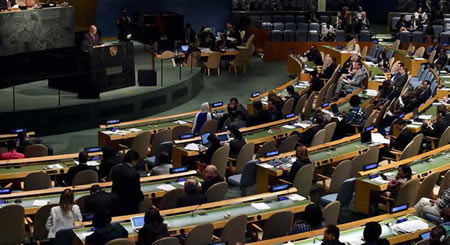 From microwave ovens and ballpoint pens to car rentals and digital tablets, these choices reflect the extent of South Africa’s international relations.
From microwave ovens and ballpoint pens to car rentals and digital tablets, these choices reflect the extent of South Africa’s international relations.
None of these items or services would be available to South Africans, were it not for government-to-government contact which in turn opens the door for business-to-business transaction.
When government leaders or public servants travel abroad to participate in summits, conferences or to lead business or, for that matter, sports delegations, we do so to build relations with the people of the world from whom our country was isolated during the apartheid era.
This is the way international relations is conducted among all the countries of the world and it is the means through which relations among governments create opportunities for the private sector and individuals to exploit.
The world has become the post-apartheid South Africa’s oyster, to the extent that we relate positively and constructively to just about every nation on earth, including those where conflict and instability may be an unfortunate reality.
It is often in such situations of tension and strife that South Africa is invited by interest groups to offer its experience post-conflict reconstruction and development and help bridge divides or silence the guns of war.
Our ANC-led government takes its cue from our Freedom Charter which declared that “There Shall be Peace and Friendship”, with the further explanation that “South Africa shall be a fully independent state which respects the rights and sovereignty of all nations” and that we would as a nation “strive to maintain world peace and the settlement of all international disputes by negotiation – not war”.
Within South Africa itself, the Freedom Charter said that “peace and friendship amongst all our people shall be secured by upholding the rights, opportunities and status of all”.
The world can, at times, be a daunting and dangerous place where peace and friendship is undermined or wiped out by instability, violence and terror. New threats are emerging all the time, in all corners of the globe, as new movements or individuals sow disunity or death – or even as new technologies present opportunities for new dangers such as cybercrime.
It is in this world that South Africa has in the past 20 years emerged as a voice of reason and an example of how a seemingly unwinnable crime against humanity – such as apartheid – can be overcome.
At the same time, South Africa has taken a principled stand, supported by many countries of the world, demanding that the global governance system – beginning with the apex United Nations Security Council (The UNSC) – be democratised.
Seventy years after five countries that had been party to World War 2 assumed positions on the UNSC, all member states remain tied to the final word on global issues as determined by the so-called Permanent Five.
Since this type of management is unacceptable at the level of a school governing board, a football club or a national government, South Africa is determined to campaign alongside its partners in the international community to ensure that democracy filters upward (for a change) from the national level to the global stage.
 The benefits of South Africa’s programme of international relations and cooperation filter through our economy and society in many ways.
The benefits of South Africa’s programme of international relations and cooperation filter through our economy and society in many ways.
Opportunities for South Africans to export products and services to other countries or study abroad; visits to South Africa by high-profile entertainers, the availability in South Africa of complex technology in healthcare, and the array of destinations South African tourists can freely visit internationally are among the practical outcomes of our engagement with the rest of the world.
The country also continues to attract foreign direct investment (FDI) in spite of the global economic situation. This was worth R43 billion in the 2014/15 financial year and US$ 3.31 billion from January 2015 to July 2015.
The United Kingdom, United States of America, Germany, Australia and India were the key FDI sources for South Africa.
South Africa also invests in other economies. The top five destination countries for FDI outflows from South Africa include the United Kingdom, Nigeria, Ghana, Zambia and United States.
Since 1994, trade with sister countries on our continent has increased 35-fold to about R400 billion, thus promoting intra-Africa trade.
South Africa’s Good Story is therefore written not just in Pretoria or Polokwane, but in Addis Ababa, Lusaka, London, New York, Doha, Rome, Jakarta, Windhoek, Sao Paolo and many other places where we cultivate peace and friendship.
These are also places where, increasingly, the people of the world encounter, with great satisfaction, in their own supermarkets and vehicle showrooms, products declaring: “Made in South Africa.”
Let’s keep building peace and friendship.
Serving communities better
Serving communities better Estelle GreeffLocal government
Government is taking seriously its commitment to communicate more with citizens.
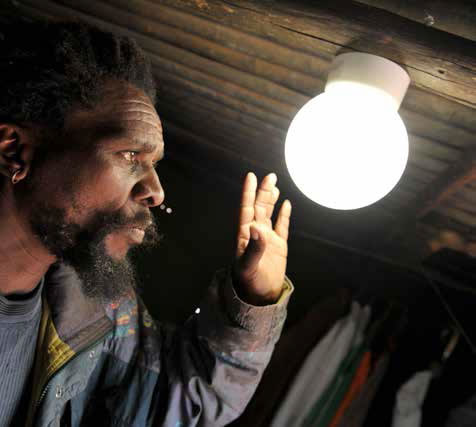 Last year it introduced its Back to Basics (B2B) programme and according to Cooperative Governance and Traditional Affairs (CoGTA) Minister Pravin Gordhan, the result is increased interaction with community members.
Last year it introduced its Back to Basics (B2B) programme and according to Cooperative Governance and Traditional Affairs (CoGTA) Minister Pravin Gordhan, the result is increased interaction with community members.
B2B, which was unveiled last September, is aimed at ensuring that municipalities go back to effectively delivering basic services like the reliable supply of water and electricity, refuse collection, working traffic light and filled potholes.
In an interview with Vuk’uzenzele, Minister Gordhan said a lot of work has been done by government to improve the quality of service delivery, and that municipalities now interact more with citizens through ward committee meetings. Traditional leaders are now also part of the council forums.
“While B2B has had significant successes, it has not yet had sufficient impact in terms of citizens’ experience of local government,” he said.
Strengthening community participation
Minister Gordhan said a significant achievement has been the participation of traditional leaders in council meetings.
The Minister said the six months report of the B2B pillar showed that progress was being made in the main pillars of the programme.
Referring to a report that probed the impact B2B had in its first six months, he said of the 236 municipalities that reported at least once in the six months, 108 had traditional leaders within their jurisdiction and serving on their council in an ex-officio capacity. Some 571 traditional leaders served on these 108 councils.
With regard to the delivery of free basic services, 4.9 million households in reporting municipalities received free basic water each month. About 1.7 million households in reporting municipalities received free basic electricity each month.
The Minister said that as the B2B programme moves into the next phase, municipalities need to work smarter and be innovative in executing their day-to-day duties to increase the impact of service delivery. They also need to interact more with stakeholders and should find ways to ensure information on government programmes filters down to all communities. Social media platforms like Facebook must be better used.
Centralised customer surveys would help determine what municipalities can do to improve their service delivery.
“Additionally, CoGTA will partner with the Government Communications to develop a communication strategy aimed at improved communication from government to citizens … through local newspapers, local radio stations and via text messaging,” he said. Interaction with “influencers” – those individuals or organisations in the society that have a high level of influence on public opinion – must also be strengthened.
b2b achievements
Reporting municipalities reported that:
- 4.9 million households received free basic water
- 1.7 million household free basic electricity each month.
Engaging communities a high priority
The Minister said that while B2B has enabled government to address several areas of concern, weaknesses in the delivery of basic services remains a reality in many municipalities, and levels of service delivery vary dramatically throughout the provinces.
He added that only a few municipalities have done Citizen Satisfaction Surveys and incomplete and inaccurate municipal data remains a concern.
Challenges:
- The quality of diagnostics and analysis of data by national and provincial CoGTAs were not good enough and has not led to effective action to address poor performance.
- The lack of capacity and inappropriate organisational structures and work processes in provincial CoGTA departments makes it a challenge to monitor and drive improvements in key performance indicators at municipal level.
- The uneven participation of national and provincial sector departments in provincial B2B task teams, and the lack of central coordination and standardisation of work of the provincial task teams, have resulted in problems with quality of information and in the quality of B2B action plans.
- Certain B2B actions plans do not address specific key underlying causes of problems in municipalities.
- There is an insufficient mobilisation of social partnerships, such as traditional leaders, business and civil society.
- There is still a lack of clarity on the role of district municipalities to support their locals.
- Central coordination of the B2B approach must be improved.
Operation ‘Kuka Maoto’ speeds up service delivery
Operation ‘Kuka Maoto’ speeds up service delivery Estelle GreeffLocal government
Over 1 000 street lights repaired, over 300 illegal connections disconnected, over 800 water meters installed, nine cemeteries cleaned and 207 road intersections painted.
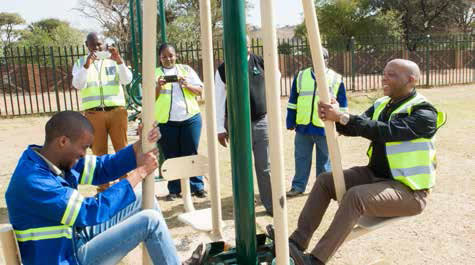 These are some of the service delivery achievements registered by the City of Tshwane as a result of a service delivery initiative called “Kuka Maoto”.
These are some of the service delivery achievements registered by the City of Tshwane as a result of a service delivery initiative called “Kuka Maoto”.
The initiative was launched by the Executive Mayor of Tshwane, Kgosientso Ramokgopa, in March in Mamelodi, east of Pretoria, and is aimed at improving the quality of services by addressing backlogs.
The key areas of the initiative are cleaning of the cemeteries, grass cutting, pothole repairs, gravelling of roads, maintenance of parks and public facilities, road markings and signs, water leakage, street lights and high mast repairs, illegal dumping and waste management, removal of illegal posters as well de-weeding of sidewalks and pavements.
Two days per month will be dedicated to this operation, led by the executive mayor, members of the mayoral council, councillors and senior officials.
On these days, officials wear overalls, roll up their sleeves and dirty their hands. The operation has so far drastically reduced critical backlogs in electricity, water and sanitation, urban management, roads and storm water and illegal advertisements in the following five regions in Tshwane.
The following milestones have so far been achieved:
 Electricity:
Electricity:
- 1 124 street lights were repaired
- 79 high mast lights were repaired
- Disconnected 393 illegal connections
Sanitation:
- 851 water meters were installed
- 334 water leaks were attended to and fixed
- 64 manholes fixed
- 10 fire hydrants were locked
- 28 water tanks were repaired
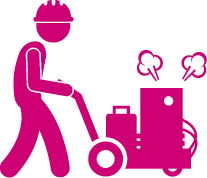 Roads and storm water:
Roads and storm water:
- 1 456 m2 of potholes were patched
- 207 road intersections were painted
- 114 road signs and poles were erected
- 5.6 km of roads were surfaced /resealed
- 71.04 km gravel roads/streets were re-graveled
- 71 catch pits were unblocked
- 24 025 m2 storm water channels were cleaned
 Urban management:
Urban management:
- 233 trees were pruned
- 76 illegal dumping sites were cleared
- 55 trees were planted
- 9 cemeteries cleaned
- 457 000 m2 of grass was cut
The operation has helped to clear the service delivery backlog and to speed up the pace of service delivery.
For instance, on average, approximately 25 street lights are fixed in a week, but during one of the recent operations of Kuka Maoto, 48 were repaired over five days.
Kuka Maoto has now become the benchmark by which the municipality measures itself. It has proved that the pace of service delivery can indeed be speeded up.
* Selby Bokaba is the spokesperson for the City of Tshwane.
City gives informal trading a R101 million boost
City gives informal trading a R101 million boost Estelle GreeffLocal government
For Thandiwe Chiliza, who has been a street trader for over 16 years, being given a trading stall by the eThekwini Municipality to run her business will help her grow as an entrepreneur.
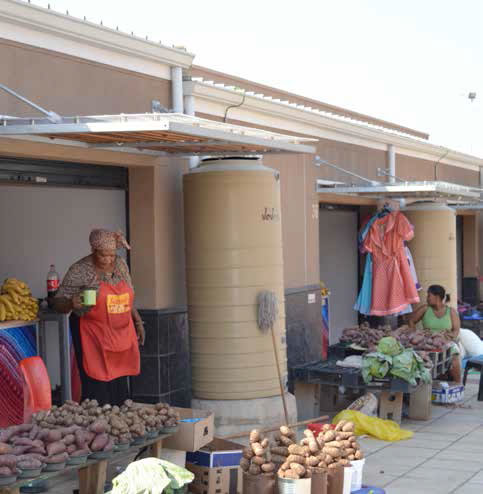 When handing over the newly-constructed trading stalls to entrepreneurs in KwaJeena – in uMlazi, KwaZulu-Natal, Deputy Mayor of eThekwini Municipality Nomvuzo Shabalala said informal traders can no longer be considered as a temporary phenomenon as they contribute to the City’s economy.
When handing over the newly-constructed trading stalls to entrepreneurs in KwaJeena – in uMlazi, KwaZulu-Natal, Deputy Mayor of eThekwini Municipality Nomvuzo Shabalala said informal traders can no longer be considered as a temporary phenomenon as they contribute to the City’s economy.
“The City realised that the sector plays a central role in tackling poverty which is why we set aside R101 million last year to improve the working condition of informal traders in order to formalise the sector,” she said.
The new formal structures for traders have sanitation facilities, electricity, water and security.
Chiliza, one of the traders equipped with proper facilities to run her street trading business, said the trading facilities would grow her business and keep her stock safe.
“When it rained or during winter when it was cold we were forced to pack our goods and go home without making any profit. We also used to walk long distances transporting our goods on trolleys to the warehouse and carrying it back again in the morning.
“We now lock our goods inside the stalls since there is also 24-hour security within the yard,” said Chiliza.
Shabalala added that the Municipality would continue developing this fast-growing sector, which currently has 42 700 registered informal traders. She said the development was part of the City’s programme to contribute to urban management and regulation.
“Besides the provision of infrastructure, the Municipality runs programmes to train and develop informal traders in the fields of business and financial management in order to grow their businesses. The project is on-going in other areas.
“This project will have a great impact on street traders because the improved trading conditions will attract more customers and they will be able to trade under any weather conditions,” said Shabalala.
The Municipality does not allow people to trade informally without a trading permit from the City.
A permit can cost anything between R264 to R1 128 per year to own a street-vending permit within the Municipality, depending on whether the applicant wants a sheltered place or is happy operating on the side of the road.
What you need to apply for a permit:
- You need to write an application letter that states the goods that will be sold.
- Explain what will be used to conduct the business, such as a cart, tables or marquee.
- Include the applicant’s address and telephone number in order for the Municipality to give a response.
- Provide the Municipality with a letter from the owner of the building that the applicant wishes to trade next to.
- Include a copy of the applicant’s identity document.
This information will be directed to the manager in charge of the area applied for; site inspections will then be done and authorisation given if there are no objections. Site inspections will evaluate whether the area complies with all relevant requirements, such as road traffic requirements and health regulations.
Once all the documents are submitted, the processing of the street-trading permit normally takes around 30 working days. The applicant is notified either telephonically or via post.
For more information on how or where to apply for a permit, visit: www.durban.gov.za or call the eThekwini Municipality.
*Nonduduzo Ngcongo works for the eThekwini Municipality.
Aganang communities get access to water
Aganang communities get access to water Estelle GreeffOver a 1 000 households in three different villages in the Aganang Local Municipality will benefit from the newly launched water projects.
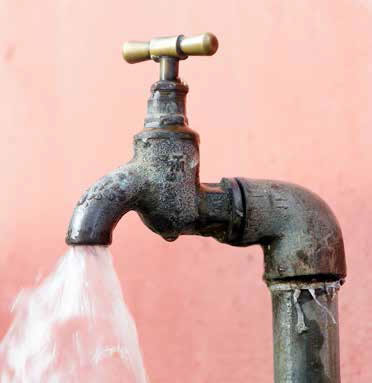 In its continuous effort to increase access to water and improve the quality of lives of people, Capricorn District Municipality (CDM), handed over water projects to communities in Mashashane, Matlala and Maraba in Aganang Municipality recently.
In its continuous effort to increase access to water and improve the quality of lives of people, Capricorn District Municipality (CDM), handed over water projects to communities in Mashashane, Matlala and Maraba in Aganang Municipality recently.
Executive Mayor Gilbert Kganyago handed over the water projects to Kgomoschool, Naledi, Phofu, Bergsicht and Lepotlako.
“I hope the projects will go a long way in further expanding the water reticulation network and reduce the backlog of water supply in this area,” said Mayor Kganyago.
The handover comes four months after Kganyago made a commitment in his State of the District Address that the CDM “continues to intervene in areas where water shortages are severe” as it strives to reduce the water supply backlogs in more villages.
Water services backlog in Aganang currently stands at 22 per cent and the area has long been serviced through various regional water schemes which is not sufficient.
In Kgomoschool the construction of elevated steel tanks and a pipeline now benefits 463 households and the project in Phofu 304 households through yard connections and communal taps.
In Naledi, the project benefits 400 households through yard connections reticulated from an elevated steel tank.
Maria Matsaung of Naledi village said she was relieved that finally her village got water.
“This hopefully ends years of travelling long distances to fetch water,” she said.
*Moffat Senyatsi works for the Capricorn District Municipality.
Be water smart:
South Africa is a water scarce country and it is up to all of us to save every drop. Here are a few tips to help you save water:
- Never pour water down the drain when there may be another use for it such as watering a plant or garden, or for cleaning.
- Make sure your home is leak free. Many homes have hidden water leaks.
- If the toilet handle frequently sticks in the flush position letting water run constantly, replace or adjust it.
- Store drinking water in the refrigerator. Don’t let the tap run while you are waiting for cool water to flow.
- Do not use running water to thaw meat or other frozen foods. Defrost food overnight in the refrigerator or use the defrost setting on your microwave.
- When washing dishes by hand, fill one sink or basin with soapy water. Quickly rinse under a slow-moving stream from the faucet
- If you have a well at home, check your pump periodically.
- Avoid flushing the toilet unnecessarily. Dispose of tissues, insects and other similar waste in the trash rather than the toilet.
Why safe water?
- South Africa is a water-scarce country.
- Unless we reduce our water use, water restrictions will be introduced.
Whose responsibility is to conserve water?
- Everybody uses water and it is everybodyís responsibility to use water wisely, sparingly and to save it wherever possible.
How can I play my part?
- You can play a part by being aware of your impact on water consumption and your responsibility to save it and by telling others about it.
- You can save water at home, at work, at school and anywhere you use water.
- Use the many tips to save water and try to find other ways to save it.
Source: nelsonmandelabay.gov.za
New clinic for Ga-Thaba village
New clinic for Ga-Thaba village Estelle GreeffA new clinic has drastically changed lives in the village of Ga-Thaba, Limpopo.
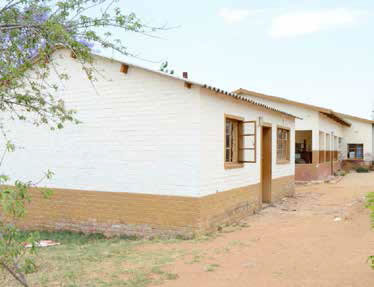 The Soetfontein Clinic, which was opened in 1971, only had two consulting rooms, a delivery room and a room that doubled-up as a pharmacy and storeroom.
The Soetfontein Clinic, which was opened in 1971, only had two consulting rooms, a delivery room and a room that doubled-up as a pharmacy and storeroom.
Fast forward to 2015 and the community of Ga-Thaba village can now access a new clinic that will serve over 800 households in the village.
The new clinic adds to the list of health facilities in the province. Citizens in the povince have access to 444 clinics, 26 health centres, 30 distict hospitals, five regional hospitals, three specialised hospitals and two tertiary hspitals. The Soetfontein Clinic has four consulting rooms, an emergency treatment room, a counselling room (for both trauma and HIV and Aids), a maternity ward with three sections (first stage, labour room and post-natal room), a linen room and a diagnostic room.
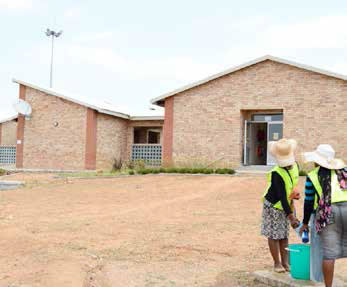 It also has seven professional nurses, two enrolled nurses and one assistant nurse.
It also has seven professional nurses, two enrolled nurses and one assistant nurse.
The clinic was built by the Limpopo Department of Health and will go a long way towards bringing health services to the people of Ga-Thaba.
Initially the department budgeted R11 million for the Soetfontein Clinic and spent R15.2 million on the construction of the clinic.
Since it was opened in April, Soetfontein Clinic has delivered 18 babies.
“It makes me proud to walk around this new facility and it will help us as healthcare givers to render proper services to the community,” said Professional Nurse Anna Motimele at the official opening of the clinic.
The clinic was officially opened by the MEC of Health in Limpopo Dr Phophi Ramathuba who said she is hopeful that it will bring positive change to their lives.
“I hope this clinic will be the start of good things to come for this village. This is what we mean when we talk about service delivery.
“We don’t want a situation where when someone goes to the clinic with flu they are given Panado, as if Panado cures everything,” said MEC Phophi.
Limpopo’s provincial health department provides and manages comprehensive health services for communities. The health facilities in the province ensure that communities throughout the province have access to healthcare.
For 44-year-old Johana Malahlela the opening of the clinic will save her some money when she takes her son for a check-up.
“There were times when I spent a lot of money taking my son for a check-up. I would have to go either to Mankweng or Polokwane and sometimes spent up to R300 just to go there.
“Now I can walk from my house to the clinic and my son will be taken care of,” said the mother of two.
Sharing Malahlela’s sentiment was 55-year-old Kgabo Manamela whose family have used the old clinic for decades. He is looking forward to the new facility.
“This new clinic will help us a lot, especially the old people who can’t travel long distances to Polokwane,” he said.
Traditional leader of the village Kgoshi Maisha Molepo III urged the community not to burn the clinic when they have grievances against the government.
“This clinic does not belong to these people,” he said, pointing to the MEC and her delegation.
“It belongs to us, as people of Ga-Thaba, and I don’t want to be called tomorrow and told that you’ve burnt it because you are not happy with government services.
“If you do, I will bring the police and the people who burnt it will be caught will be locked up for a long time,” he said to loud cheers.
Health facilities in Limpopo
444 clinics 26 health centers 30 district hospitals five regional hospitals three specialised hospitals two tertiary hospitals.
Manxili gets state-of-the-art clinic
Manxili gets state-of-the-art clinic Estelle GreeffThe new R20 million state-of-the-art Manxili Clinic in Nquthu, KwaZulu-Natal, will bring much-needed relief to the 13 000-strong rural community.
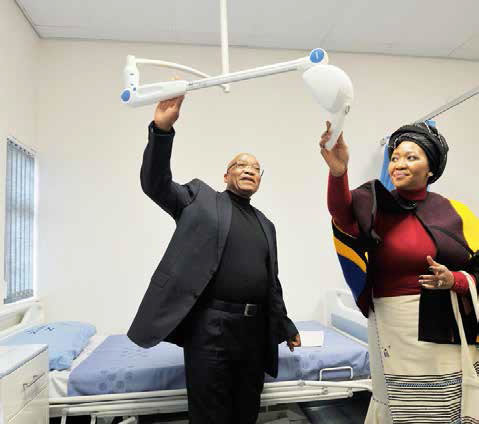 Previously, community members had to wait for a mobile clinic to visit the area once a month or travel nearly 10km to Mangeni Clinic, mostly on foot, to access health care services. The mobile clinic would travel from the mother hospital, Charles Johnson Memorial Hospital, which is situated some 62km away.
Previously, community members had to wait for a mobile clinic to visit the area once a month or travel nearly 10km to Mangeni Clinic, mostly on foot, to access health care services. The mobile clinic would travel from the mother hospital, Charles Johnson Memorial Hospital, which is situated some 62km away.
Community member Maqili Buthelezi said if he missed the mobile clinic date, he had to spend R54 to collect his medication from Charles Johnson Memorial Hospital.
“This new clinic provided to us by our government is going to help us a lot and we are very grateful for it,” he said.
Residents in KwaZulu-Natal are able to access health services from 72 provincial hospitals, 25 nursing colleges and 18 community health centres.
The Manxili Clinic, which was officially opened by President Jacob Zuma recently, complies with government’s Operation Phakisa model of being an “Ideal Clinic”, which demands adherence to service excellence in accordance with national health core standards.
The opening was also attended by the Deputy Minister of Health Dr Joe Phaahla, KZN MEC for Health Dr Sibongiseni Dhlomo, members of the KZN Health Portfolio Committee, and representatives of the Joint United Nations Programme on HIV and Aids (UNAIDS), Mayors, Councillors and Amakhosi.
The clinic will enhance government’s efforts to fight the burden of disease, which includes the spread of HIV and Aids, TB infections and mother and child mortality and morbidity in uMzinyathi District.
Deputy Minister Phaahla said at the opening that the department is acting on President Zuma’s instruction to follow the mandate of the National Development Plan, which says that for South Africa to develop, rural areas must be developed alongside urban ones.
“The goals of the National Health Insurance plan will not be met if we do not ensure that our rural health services are improved, and are of good quality,” said Deputy Minister Phaahla.
Healthcare in the province varies from the most basic primary health care, to provincial hospitals. These facilities don't only provide health service, but the nursing colleges in the province also mean that the public health system can be given a boost as new nurses qualify.
The building of Manxili Clinic is the result of a partnership between the Department of Health, the Tobeka Madiba-Zuma Foundation and the community.
A total of R20 million was spent on the construction of Manxili Clinic. The Department of Health’s own contribution for the clinic and residences amounted to R 16 203 474. 41, while furniture and equipment for the entire project cost R 1 624 219. 87. The Tobeka Madiba-Zuma Foundation contributed over
R2 million.
Deputy Minister Phaahla also pledged to ensure that the clinic upholds the national health core standards, which demand adherence to cleanliness, infection control, reducing long queues, availability of medicines and other essentials, security and safety of staff and patients, as well as a positive attitude of staff.
Since Manxili Clinic started operating, 72 100 male condoms have been distributed and 107 patients have received reproductive health services.
Manxili Clinic provides health services such as antenatal care to pregnant mothers, cervical cancer and TB screenings, HIV testing and counselling.
Health facilities in KwaZulu-Natal
72 provincial hospitals 25 nursing colleges 18 community health centres
Public health gets a boost
Public health gets a boost Estelle GreeffThe country’s public hospitals are receiving much-needed relief, thanks to the South African Cuban medical doctor programme.
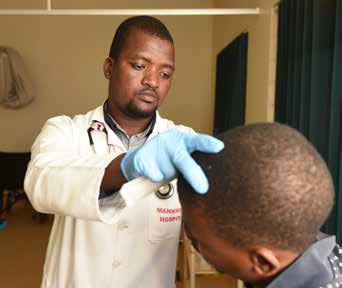 The programme trains South Africans as doctors in Cuba. The candidates for the programme are chosen from rural, under-serviced areas. Once they complete their training, the graduates are placed in outlying rural areas as part of ensuring that health care services reach far flung corners of the country.
The programme trains South Africans as doctors in Cuba. The candidates for the programme are chosen from rural, under-serviced areas. Once they complete their training, the graduates are placed in outlying rural areas as part of ensuring that health care services reach far flung corners of the country.
The SA-Cuba programme was started in the mid-1990s when South Africa and Cuba entered into an agreement known as the Cooperation Agreement in the Field of Public Health. This was to allow Cuban doctors to work in South Africa.
The agreement was revised in 1996 to include the training of South African medical students in Cuba to address shortcomings with regard to disease management in South Africa’s public health sector.
According to the Department of Health, the medical training programme has grown over the years.
When Deputy Minister of Health Joe Phaahla delivered his budget vote early this year, he said close to 3 000 South African students were studying in Cuba.
Limpopo gets a boost
Spokesperson for the Limpopo Department of Health, Billy Teffo, said since 1999 to date, 450 students have been awarded scholarships to study medicine in Cuba.
“A total of 121 students have completed their training and have been placed at various hospitals,” said Teffo, adding that 21 students graduated in July this year at the University of Cape Town and were doing their internship programme.
“A total of 295 students are currently in Cuba in various levels of study.”
The Limpopo Department of Health also sent 110 new recruits to Cuba in September this year to study medicine.
“The programme is delivering positive outcomes because the Cuban-trained doctors are sent to district rural hospitals.”
Teffo said this has a positive impact on primary health care because the Cuban-trained doctors’ training has focused strongly on primary health care, which is the most pressing need at local clinics and community health care centres.
Cuba’s medical system has a strong focus on health education and health promotion, and the success of this approach is reflected in their health statistics, with most Cubans only developing hypertension and other non-communicable diseases quite late in life. There is also a very low rate of communicable disease in the country.
Lessons from Cuba
Matsobane Lekalakala, 33, was trained in Cuba but now works in South Africa, ploughing his skills back into the community in which he lives.
Dr Lekalakala works at the rural Thabaleshoba Health Care Centre near Rebone, about 100 kilometres from Polokwane in Limpopo.
He says that if South Africa is to tackle its burden of disease, an effective primary health care model like Cuba’s is needed.
Primary health care can be defined as providing health care at community level, and making clinics and health care centres the first point of entry to community members.
Dr Lekalakala, who originates from Limpopo, says the major lesson he learnt in Cuba is preventing disease before it happens.
“The Cubans are taught health education at school from a young age. As a result, the rate of communicable disease is very low.
“The mortality rate and infant mortality rate is also very low. They see the doctor very early if they feel unwell because of their strong primary health care system. I dream and hope that one day South Africa will achieve the same kind of primary health system.”
Dr Lekalakala returned from Cuba in 2007 and in 2008 he did his final year of medicine at the University of Limpopo (Medunsa).
“I come from a poor background and going to university was not a given. But I was not discouraged because I knew that through education my life would be turned around.”
Dr Lekalakala explains that after completing matric in 2000, he registered for a degree in optometry at the University of the North.
“My parents did not even have money to pay for my registration, but because I had good marks the university gave me a bursary which also covered my registration costs.”
Optometry was not Dr Lekalakala’s first choice. He wanted to become a doctor but because the university only took a certain number of medical students, he had to settle for a related field of study.
“I did one year of optometry then one day when my father was listening to the radio he heard an advertisement that the government was looking to train young people from disadvantaged backgrounds in Cuba to become doctors. I applied, and I was accepted.”
He said going to Cuba changed his life and has encouraged him to serve his community.
“I have always had a desire to serve my community, especially in the health sector. Throughout my childhood, it was nurses who treated me and never a doctor. I wanted to bring change to my community.”
After graduating, he did his internship and community service at Mankweng Hospital Complex in Pietersburg before being appointed as a medical officer.
In 2013, the Limpopo Department of Health suffered a major blow when four babies died at the George Masebe Hospital in Mokopane because there were no doctors to treat them.
Dr Lekalakala was touched by the story and he resigned from Mankweng Hospital and asked the department to transfer him to George Masebe.
“I felt that the mothers that lost their children could have been members of my family. I felt obliged to help.”
When the Limpopo Health Department opened the Thabaleshoba Health Care Centre, Dr Lekalakala was the first to raise his hand to be the centre’s only doctor.
“My conscience did not allow me to live in an urban area while people in a rural area did not have a doctor.”
On average, he sees between 36 to 40 patients a day. “It’s hard work but seeing my patients happy after treating them is fulfilling. This is enough for me.”
Every year, provincial health departments advertise bursary schemes for young people to be trained in Cuba.
For more information on the bursary, contact your local health district office.
RSA/Cuban Medical Scholarship
This Scholarship is only for students that want to pursue their studies in Medicine. Students who are based in Limpopo should take note of the criteria below:
Applicants must be:
- Only South African candidates who originate and reside permanently in Limpopo Province and come from previously disadvantaged communities and poor households
- Candidates must be in possession of RSA Passport
- Candidates must have passed Grade 12 with exemption and obtained relatively good symbols in Mathematics, Physical Science and Biology (e.g. symbols 7, 6, and 5)
- Candidates must be prepared to be away from their homes and the country for the maximum period of six years though allowed to return home in 2017 and 2019 for one month vacations
- Candidates must be prepared to enter into Contract with Limpopo Department of Health that immediately upon completion of their studies they will serve solely Limpopo Department of Health for the period they were financially assisted
- All Students registered at Universities and Universities of Technologies for any other course are excluded to participate in the programme
The following health conditions are not allowed entry in the Republic of Cuba: HIV/AIDS, TB, Hepatitis A and B, and Pregnancy
Youth-owned business saving lives in KZN
Youth-owned business saving lives in KZN Estelle GreeffWhen S’thembiso Ngubo and Nelly Ngcobo were working together at an emergency medical service company in Durban, KwaZulu-Natal (KZN) they were inspired to open their own company.
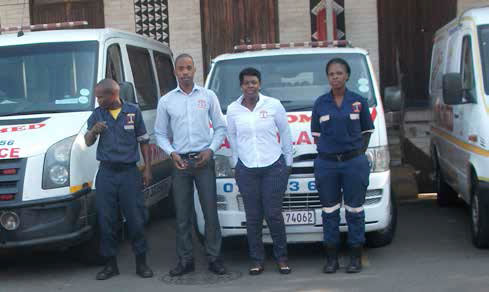 Ngubo and Ngcobo are now co-owners of Afromed Medical Services, a Durban based company that offers ambulance services to people of KZN. The company also obtained a contract for servicing GEMS clients in need of ambulances throughout the province.
Ngubo and Ngcobo are now co-owners of Afromed Medical Services, a Durban based company that offers ambulance services to people of KZN. The company also obtained a contract for servicing GEMS clients in need of ambulances throughout the province.
Ngubo said when they started the company they did not have an ambulance of their own and had to hire ambulances from other companies.
“We approached private companies for assistance but they didn’t understand the nature of our business,” he said.
In 2013 the company received a R8 000 inventory for their business through the National Youth Development Agency (NYDA) and they used voucher for promotional materials and marketing.
The NYDA was established in 2008 to help address some of the problems facing South African youth, such as skills development and unemployment.
They also approached Small Enterprises Development Agency (Seda), which helped them through the small business incubation programme. Seda is an agency of the South African Department of Trade and Industry and aims to develop, support and promote small businesses to help them grow and become sustainable.
“Having Seda as our business mentor helped us a lot. Seda guided us when we were entering the Lion’s Den Competition run by eThekwini Municipality to help small business. We won R40 000 at the competition,” said Ngubo.
The pair used the money to buy their first ambulance.
Ngubo said that in 2014 they entered uMyezane competition run by KwaZulu-Natal Department of Economic Development and won R120 000 which they used to buy their second ambulance as well as ambulance equipment.
“We never looked back since then.”
The company now owns seven ambulances, three emergency response cars and operates 24 hours, seven days a week.
“Our clientele has grown. We have 11 permanent paramedics and 24 casuals,” said Ngcobo.
The company also launched the Afromed Ambulance Service policy plan. The monthly contribution towards this plan for a family of five members is R50. It covers all family members and there is no waiting period.
Wenzile Sishi ,who is an administrator at Afromed Medical Services, said she enjoys her work because it helps her to provide for her family.
“The experience I have gained here is going to help me a lot as I’m planning to open my own company one day,” she said.
Ngubo’s advice to young entrepreneurs is simple. “In life you have to dream and you have to be persistent, never give up. When starting a business do not be money driven but be ambitious. Your ambitions will add money to your pocket,” he said.
Sheriffs at your service
Sheriffs at your service Estelle GreeffWhen the word sheriff is mentioned, many South Africans become concerned and fearful that their belongings will be taken or seized. Some think sheriffs are the bearers of bad news and should be avoided at all costs, but this is not the case. A sheriff is a fair and independent official of the Court appointed by the Minister of Justice and Constitutional Development (DoJ&CD).
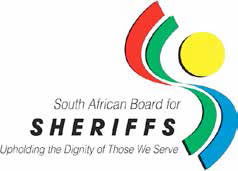 According to Charmaine Mabuza, Chairperson of the South African Board for Sheriffs (SABFS), the sheriffs’ profession is an important arm of the administration of justice in South Africa, without it, justice would grind to a halt.
According to Charmaine Mabuza, Chairperson of the South African Board for Sheriffs (SABFS), the sheriffs’ profession is an important arm of the administration of justice in South Africa, without it, justice would grind to a halt.
“A sheriff is appointed to serve or execute all documents issued by a court, these include a summons, notice, warrant or a court order. To give you further peace of mind a sheriff also carries a valid identification card issued by the SABFS at all times, and is able to produce it on request,” said Mabuza.
How to deal with a sheriff
The department encourages all citizens to cooperate in situations when dealing with sherriffs. Do not hide when you see a sherriff, it is important that you receive and are made aware of the court’s actions. A sheriff will explain to you the contents of the court document and identify what you need to do next; a sheriff will also keep your private affairs confidential. If there is a court order that requires a sheriff to attach certain assets like your vehicle or furniture on your premises, a sheriff will comply. The Sheriff however may not attach and remove necessary items such as your food, beds, bedding or clothing. There are also limitations on other things, such as tools of trade you may need to carry out your work, these cannot be attached.
South Africa has 362 sheriffs:
172 are white 137 are Africa 28 in India 25 are Coloured
If a sheriff comes to your home or place of work ask for proof of identification, listen carefully to the sheriffs instructions, be sure to understand what is required of you, do not interfere with the sheriff or deputy sheriff from performing their duties, and do not give false or misleading information.
Remember the sheriff acts under orders from the court. If you do not follow the instructions you may be liable for prosecution and further costs
Citizens rights when it comes to sheriffs
- The sheriff must treat you with dignity and respect at all times
- The sheriff must explain the contents of the document and what you need to do next
- The sheriff must as far as possible keep your private affairs confidential
- The sheriff may not attach and remove necessary items such as food and beds, bedding and clothes. There are also limitations on other things, such as tools of trade you may need to carry out your work, which may not be attached.
The department is working hard to transform the sherriff’s profession in the country to ensure that it reflects the demographics of the country in respect of race and gender. A guide for sheriffs titled “The South African Sheriffs’ Guide: Practice and Procedure was launched recently. It aims to transform the profession. Prior to the 1994 administration, there were 465 sheriffs operating nationally. Of these 22 were women, 414 were white, 44 were African, 5 were Coloured and 2 were Indian. To date the total number of permanent sheriffs currently operating in the country from is 362. Of these 362 sheriffs, 172 are white, 137 are African, 28 are Indian and 25 are Coloured. There are now 83 women sheriffs in the country.
Sheriffs report to the South African Board for sheriffs and must comply with various laws when performing their duties. If you have a complaint, or if you are unsure of your rights, contact the South African Board for Sheriffs at 021 426 0577 or email contact@sheriffs.org.za.
*Sinenhlanhla Mkhwanzi works for the Department of Justice and Constitutional Development
World-class centre for train commuters
World-class centre for train commuters Estelle GreeffTrain commuters will soon experience a transport system that is safe, reliable and efficient as the state-of-art Gauteng Rail Nerve Centre (GNC) was unveiled recently.
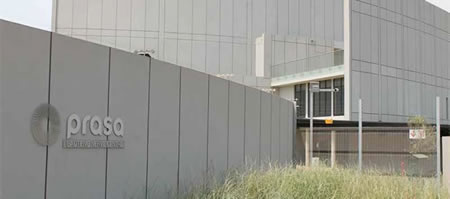 The centre, which will act as the signalling control centre for the Passenger Rail Agency of South Africa (Prasa), was launched by Transport Minister Dipuo Peters in Tembisa, Gauteng.
The centre, which will act as the signalling control centre for the Passenger Rail Agency of South Africa (Prasa), was launched by Transport Minister Dipuo Peters in Tembisa, Gauteng.
Minister Peters said she was impressed with the centre as it allows for communication with the commuters regarding any interruptions on the network.
The centre also has a protection room, which will monitor criminal activities at train stations and depots through CCTV footage.
“When we say the train is late people will be immediately informed, it is very important that people be timeously informed so that they can manage their time.
“I am happy about the integrated communication centre which means the people at the stations will be informed on what is happening because the centre would have picked up a challenge that is there, but also in terms of intervention for correction or attending to the challenge that also for me is very important,” she said.
Minister Peters said the new system at the centre is advanced and will put an end to train drivers using cellphones to communicate with the centre.
The aim of the nerve centre is to address Prasa’s challenges due to railway infrastructure and technology that has reached the end of its design lifespan, poor levels of reliability and predictability.
Gauteng Transport and Roads MEC Ismail Vadi said the staff of Prasa would be trained on how to run the system, which will be integrated with the Gautrain system to ensure that the entire railway network in the province is monitored.
“We hoping in the new year the old centre will be decommissioned and then the new centre will be operational.
“We are hoping that in the next few months a technical team can get together so that in the shortest possible time we can have a birds eye view of the entire rail network, both Gautrain and Metrorail within the centre,” MEC Vadi said.
The programme to improve the transport system for commuters will also be rolled out in Durban and the Western Cape at a later stage.
“There is a lot of investment that is being made by government to improve transportation especially in the rail space.
“Government is serious about uplifting the lives of its people in South Africa,” Prasa acting Group CEO Nathi Khena.
Young farmer making waves
Young farmer making waves Estelle GreeffUnlike most of her peers, Thato Moagi is not fazed by fashion or the glitz and glamour of city life. At her age, she should be dressed in stilettos, power suits and working in an air conditioned office somewhere. Instead, this 24-year-old prefers chasing cattle, dipping goats, working the soil and driving a tractor.
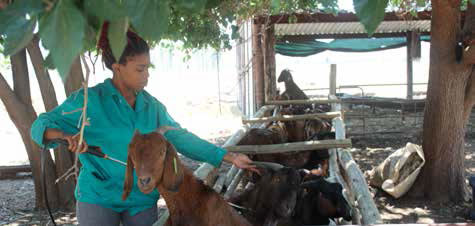 Moagi has always had a passion for farming and she knew that one day she would manage a farm.
Moagi has always had a passion for farming and she knew that one day she would manage a farm.
“As a child I always had an interest in animals. At one stage I wanted to become a veterinarian (vet) and I went to the University of Pretoria to study a degree in Veterinary Science but later changed to a Bachelor of Science degree in plant science.
A vet is a professional who studies treats animals.
“My studies opened my eyes to opportunities in agriculture.”
She did her degree between 2009 and 2013.
After completing her studies, she told her father about the many opportunities available in the agricultural sector. Fortunately, while she was still at school, her parents had already started to apply for funding from government to start a farm.
“They had been applying for funding for a long time and they became despondent because they were not getting the opportunity to get land.”
Her parents decided to take a risk by cashing in on all their life savings to buy a 48-hectare sheep farm in Modimolle, formerly known as Nylstroom, and named it Legae la Banareng Farm. Banareng is their clan name.
The family moved to the farm in January 2014 and they have not looked back.
“For most of last year, I was working really hard to get the infrastructure set up and to get this place to a point where we can say it is an operational farm,” said Moagi.
Moagi practices mixed farming, breeding Boran bulls, cattle, Kalahari goats, Dorper sheep and growing potatoes and mealies.
Currently, she supplies a well-known international frozen foods company with potatoes.
“Because of the size of the farm, we decided that we needed to do mixed farming to get as much as we can out of the land. That required us to have seasonal projects in order for us to get seasonal income.”
Moagi said getting the farm to where it is today was not easy.
“One of the challenges is that some of the people that work on the farm are older than me and giving them instructions as a young woman can be challenging at times.”
Currently, the farm employs five permanent employees and 10 seasonal employees.
She said to deal with the challenge, she asked for mentorship from her neighbour farmer who now helps her a lot with managing the farm.
“In this type of business, you need someone with experience to show you the way. It’s a tough environment and a helping hand goes along way.”
The farm has only been running for a year, but Moagi has already made waves in farming by winning the provincial award at the Female Farmer of the Year Awards for Limpopo, being crowned Top Producer for National/Export Markets and receiving R150 000 in cash.
Currently, Moagi is in talks with the Limpopo Department of Agriculture for financial backing to expand the farm. She is also awaiting feedback from many potential backers, including Anglo American and the AgriSETA.
Moagi said it’s time for young black farmers to get up, and do things for themselves.
“Government cannot do things for us all the time, we have to play our part and help government, especially us as young, black emerging farmers.”
For more information on agricultural programmes in Limpopo call the Limpopo Department of Agriculture and Rural Development: 015 294 3000 or visit: www.lda.gov.za
For training and skills development call the Agricultural Sector Education Training Authority call: 012 301 5600 or visit: www.agriseta.co.za
Sack potato farming saves water
Sack potato farming saves water Estelle GreeffA young KwaZulu-Natal woman sees more than chips and mash when she looks at potatoes. She sees the potential for sustainable farming and food security.
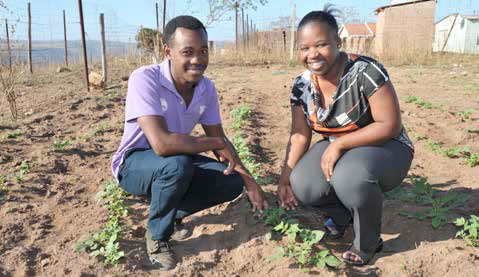 Busisiwe Mntungwa has introduced to South Africa a water-wise way to grow potatoes in a sack that is well suited to our water scarce country.
Busisiwe Mntungwa has introduced to South Africa a water-wise way to grow potatoes in a sack that is well suited to our water scarce country.
The 27-year-old, who hails from Mophela, a semi-rural area just outside of Durban, won Ithala Bank’s Inkunzi Isematholeni Youth in Business Competition for this innovation.
In the isiZulu language, the saying Inkunzi Isematholeni means ‘the young generation will give us our future leaders, therefore they must be raised to act responsibly”, a philosophy taken to heart by Ithala Bank, which is an entity of the provincial government.
Whilst not new in some parts of Africa, Mntungwa was recognised for introducing this cost and water effective method of cultivating an essential crop to South Africa.
Growing potatoes in a sack
“ We combine soil, seed and fertiliser in a sack and then add a little water,” Mntungwa said. She said the potatoes grow quicker in a sack than with the traditional soil method.
We combine soil, seed and fertiliser in a sack and then add a little water,” Mntungwa said. She said the potatoes grow quicker in a sack than with the traditional soil method.
“This farming method can be done on small pieces of land and the potatoes do not need a lot of water because the sack conserves it. There is also no loss of fertiliser and pests and diseases are easier to manage,” said Mntungwa.
“I came across this method of farming potatoes while doing research for my studies. We were tasked with looking at how other countries function in the agricultural sector and I discovered that this method was mostly used in Zimbabwe.
“I thought that since South Africa is a water scarce country, maybe farmers could consider using other methods of farming to decrease water usage.”
South Africa facing a drought
Mntungwa’s discovery comes at a time when the country is facing one of the worst droughts since 1992.
In December 2014, KwaZulu-Natal was declared a disaster area due to the drought conditions the province was experiencing.
Minister of Water Affairs Nomvula Mokonyane recently visited KwaZulu-Natal to assess progress on interventions spearheaded by her department to address the drought in the province.
"The drought we are dealing with is based on low rainfall patterns, issues of climate change, inward migration of people towards economic centres and rapid urbanisation," she said.
She asked municipalities to deal decisively with issues relating to water losses facing the province.
"The amount of water we loose to leaks, illegal connections, vandalism and lack of operations maintenance is unacceptable. We must consolidate capacity in local government to ensure we manage our water resources efficiently to prevent excessive losses due to our inability to act decisively."
The Department of Water Affairs has invested R352 million to help the province respond to the immediate challenges of water scarcity.
Passionate about uplifting the community
Not only did Mntungwa look at farming methods that save water but she realised that there are a lot of unemployed young people in her community. She gathered these people and started the Sinwabile cooperative to get them interested in agriculture and create jobs.
“I gathered young and old people from the community and told them about my idea to farm potatoes using this module and we started a cooperative.”
Deputy chairperson of Sinwabile cooperative Sibongiseni Silabela added that the unemployment rate in the community was very high and it was up to young people in the area to come up with ideas to tackle this.
“At home we have a lot of land that was not being used. Starting this business helped us put the land to good use.”
With its first harvest, Sinwabile cooperative managed to produce 250 bags of potatoes which were sold to locals.
Mntungwa said she was delighted that she was one of the winners of the Inkunzi’esematholeni competition because it will help grow the business.
“Part of our prize includes Ithala helping us with resources, capital and information on running a business.”
Ithala focuses on green economies
According to Thuli Galelekile, divisional manager of communications and marketing at Ithala bank, Inkunzi Isematholeni Youth in Business Competition focuses on green economy innovations.
“Ithala’s research unit provided an analysis of macro-economic trends covering the key industry sectors in the KwaZulu-Natal province, which highlighted a new and exciting focus on green economy sectors,” said Galelekile.
“A total of 115 entries were received of which 12 finalists were shortlisted for interviews and two were identified as winners. The submissions varied within the technology and green sectors.”
Galelekile said the total investment by Ithala into Mntungwa’s initiative includes a feasibility study, business plan development and funding of the business idea.
Anybody between the ages of 18 and 35 who resides in KwaZulu-Natal can enter the competition.
For more information, visit: www.ithala.co.za or call: 080 133 1130.
Cotton farmer making it big
Cotton farmer making it big Estelle GreeffMaria Swele, a Limpopo-based farmer, is an example of what can be achieved if you have passion and a desire to bring change in your community. Swele was a sunflower farmer until she realised there was greater potential in farming cotton.
 Between 2004 and 2008 Swele specialised in planting sunflowers but after attending cotton farming training courses she decided to make the switch.
Between 2004 and 2008 Swele specialised in planting sunflowers but after attending cotton farming training courses she decided to make the switch.
“There was a training course done by Cotton South Africa at Tompi Seleka, an agricultural college in Limpopo. I realised that cotton has more opportunities than the other crops we were planting and I’m now focusing on cotton only,” she said.
Swele completed her matric in 2002 and then completed a computer course at the University of the Witwatersrand. In 2003 she completed a short course in financial management in Dennilton.
The knowledge and skills that she gained while doing the different courses are helping her cotton business.
The courses also helped her with networking because the more courses she attended the more access she had to people that are involved in cotton farming. This helped to grow her love of cotton farming.
Today Swele owns a 32-hectare farm that produces cotton, maize and peanuts and sells her products to local customers and those beyond her Maklerekeng Village.
Swele employs 112 people, comprising 105 women and seven men. Of these, 22 are permanently employed, while the others are seasonal workers.
She sells her cotton at Loskop Cotton and the money that she has made has helped her build her own house, pay for her children’s education and helped other farmers financially.
“With the little that I make, I’ve helped some up and coming farmers financially and they managed to plant four hectares of cotton.”
Though she is running her business successfully, Swele said it has not been an easy road. One major challenge she faced was planting in a dry region.
Her advice to other female farmers is to ask for advice, especially from people who are already established in the business.
“When you face challenges don’t sit and keep quiet, go to other farmers, talk to them and seek their advice, especially those with experience.”
She said in the next few years she is determined to grow her business and employ more people on a permanent basis.
MEC pushes for subsistence farming
MEC pushes for subsistence farming Estelle GreeffGauteng MEC for Economic Development, Environment, Agriculture and Rural Development Lebogang Maile has expressed concern at the high levels of hunger as well as an overly concentrated and expensive food system.
He has urged residents to engage in subsistence farming and to take up government initiatives to curb hunger.
Subsistence farming is self-sufficiency farming in which the farmers focus on growing enough food to feed themselves and their families. Subsistence farmers have a range of crops and animals needed by the family to feed and clothe themselves during the year.
Hunger and food insecurity affects over three million people in Gauteng.
According to the Bureau for Food and Agricultural Policy from April 2014 to April 2015, the cost of a basic food basket in South Africa increased from R491 to R514 with the price of staples experiencing a 50 percent hike between 2013 and 2014, making basic food unaffordable to many poverty stricken households.
“When the price of staples increases at this level, it not only pushes many families to abject poverty but is also leads to a vicious cycle that sparks soaring prices for meat and poultry.
“The fact that the poor have to resort to skipping meals and or reducing rations to cope with hunger when 30 percent of the food produced in this country is lost through waste and dumping is an indictment to the food industry,” MEC Maile said.
The province has the Gauteng Twenty-Year Food Security Plan which is aimed at reducing the levels of food insecurity to 5 percent by 2030.
The plan also supports community food gardens with inputs, training and equipment.
Gauteng has supported over 60 000 community food gardens with technical and resources support since 2009.
The province’s interventions to integrate black small holder farmers in the food production industry has resulted in over 40 percent of the fresh produce supplied to public hospitals in Gauteng being sourced from this sector.
Over 60 000 community food gardens have received technical and resources support from the Gauteng government since 2009.
Land claims become a reality for KZN community
Land claims become a reality for KZN community Estelle GreeffA sense of elation filled the air at the Sthembile Town Hall in Glencoe, KwaZulu-Natal, as it was packed to capacity with eager recipients of the land claim.
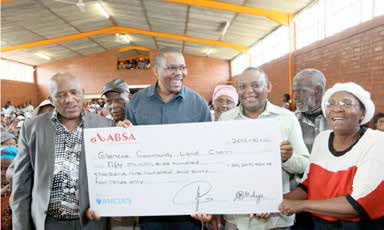 During the 1960’s, the people of Glencoe were forcibly moved from their place of residence to neighbouring townships by the then apartheid regime.
During the 1960’s, the people of Glencoe were forcibly moved from their place of residence to neighbouring townships by the then apartheid regime.
The land claim of the community of Glencoe was gazetted in April 1994 with the first approval in 2007 and 2011 respectively.
Phase 1 in 2007, verified 320 tenants with the total monetary value of R11 688 960.00 and Phase 2 verified 133 former Glencoe Land owners with a total monetary compensation of R13 839 528.00.
Member of Executive Council (MEC) Cyril Xaba advised thebeneficiaries of the Glencoe land claim to preserve the land for future generations and to invest the compensation in land for agricultural activities as this will not only guarantee food security but financial freedom as well.
MEC Xaba said the hand over is an indication that government works for the people and will do all in its power to reverse the legacy of apartheid.
“The government is also committed to non-racialism and reconciliation and to repair the damage caused by Legislation such as the Group Areas Act, which isolated communities in racial zones.”
He handed over a cheque amounting to R50 300 964.00 to 522 households with 1 300 beneficiaries.
“Today is a happy occasion as the current democratic government has made good on its promise and is giving out financial compensation of over R50 million to 522 land claimants here in Glencoe. While this is a joyful event, I cannot help feeling a sense of sadness at all that has been lost over the years.
“For me the biggest loss, not just to you as a community, but to South Africa as whole, is how these forced removals caused a breakdown in good race relations.”
He added that the provincial government is committed to helping people who a victims of being disposed from their land.
This shows that the current South African democratic government is committed to ensure that there is redress for families of land dispossessions.
*Lelethu Manentsa works for the KZN Department of Agriculture & Rural Development
People with disabilities have rights too
People with disabilities have rights too Estelle GreeffNovember is National Disability Rights Awareness Month.
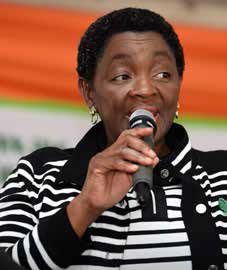 This year’s theme is “Celebrating 60 years of the Freedom Charter:
This year’s theme is “Celebrating 60 years of the Freedom Charter:
South Africa – a free and just society inclusive of all persons with disabilities as equal citizens".
Minister of Social Development Bathabile Dlamini added that prior to 1994, persons with disabilities had no rights.
“They had no recourse even if they were denied basic services such as education, health, rehabilitation and social grants on the basis of race, geographical location, gender, age or ability, as these were believed to be privileges of a few,” she said during an interview with Vuk’uzenzele.
This lack of access to certain rights only served to inspire persons with disabilities to take action, and the release of the Disability Rights Charter of South Africa in 1992 set the tone of how disability was to be approached in our new democracy.
“We salute the disability rights activists in general, and Disabled People South Africa in particular, for the revolutionary work done before and after the 1994 elections in securing the rights of persons with disabilities as equal citizens,” she said.
She added that the Department of Social Development works closely with the departments of health, basic education and higher education and training, among others, to ensure that persons with disabilities have access to and can participate fully in school and university life.
“We are happy to report that significant progress has been made. There are currently more children with disabilities enrolled in ordinary community schools than in special schools.”
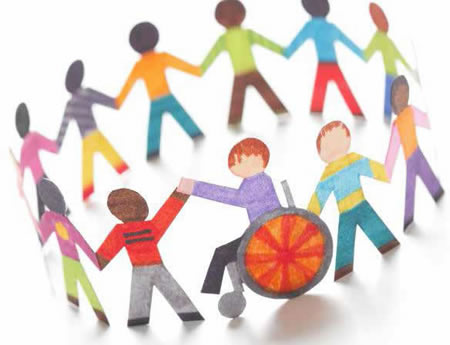 Minister Dlamini raised concerns about the quality of education and support that persons living with disability receive.
Minister Dlamini raised concerns about the quality of education and support that persons living with disability receive.
“These services are important for full access to the learning process. We believe, however, that the policy launched by the Department of Basic Education in December 2014, which formalises the system of screening, identification, assessment and support services in the education value chain, will address these shortcomings significantly.”
The minister added that her department was working with the departments of health and basic education to ensure that the service also extends to early childhood development programmes.
Another milestone in the development of persons with disability was the introduction of South African Sign Language into the curriculum of schools for deaf learners at the beginning of 2015.
Minister Dlamini is also happy with progress being made by the Department of Higher Education and Training in ensuring the inclusion of students with disabilities in universities and, increasingly, in TVET colleges.
“The establishment of Disability Rights Units at these institutions, tasked with coordinating and providing reasonable accommodation support to university students, and the availability of funding through the infrastructure grants to make university campuses physically more accessible, is definitely yielding results.”
Approval of the White Paper on the Rights of Persons with Disabilities
Minister Dlamini said Cabinet would soon finalise the White Paper on the Rights of Persons with Disabilities.
The White Paper supports measures that will hold the private sector, government and civil society accountable on the rights of persons with disabilities. It will also strengthen recourse measures for persons living with disabilities whose rights have been violated.
“Government has therefore been working on strengthening its coordinating and consultative mechanisms, policy frameworks and planning, monitoring and evaluation systems.
“These actions will culminate in the Cabinet approval of the White Paper on the Rights of Persons with Disabilities before the end of 2015.”
Disability Month, launched on 3 November, has a full calendar of events taking place including:
- The commemoration of International Day of Persons with Disabilities taking place on 3 December
- The INSETA National Disability Awards taking place on 2 December
Activities during the Month will:
- Provide a platform for government, civil society, business, labour and the media to celebrate, showcase and dialogue on progress made over the past 20 years in promoting and protecting the rights of persons with disabilities
- Isolate remaining challenges that hinder the building of inclusive caring societies where the contributions of persons with disabilities are valued and ensured
- Foster consensus on priorities to be addressed in the next five years, including re-positioning and packaging messages that promote disability as a primarily human rights issue.
Look out for other events to commemorate the Month taking place in your area.
Students with disabilities to move around with ease
Students with disabilities to move around with ease Estelle GreeffStudents with disabilities will soon be able to move around with ease and have more access to universities and Technical, Vocational Education and Training (TVET) colleges.
 The Department of Higher Education and Training is finalising a policy, which will see all universities and TVET colleges establishing a Disability Unit to address challenges confronting students with disabilities.
The Department of Higher Education and Training is finalising a policy, which will see all universities and TVET colleges establishing a Disability Unit to address challenges confronting students with disabilities.
Higher Education and Training Deputy Minister Mduduzi Manana said the issues of access and institutional practices have failed to consider the learning needs of persons with disabilities and their support needs continue to be a barrier to this sector.
“Through the policy, the new subsidies and grants put on infrastructure must ensure that the structures have ramps and desirable for students to function and work around his/her way on campus. The policy will also focus on many areas seeking to create an enable environment for learners with disabilities,” Deputy Minister Manana explained.
The Deputy Minister was speaking during a recent visit to Adelaide Tambo School for the Disabled in Dobsonville as part of his nationwide campaign to promote post-school opportunities for learners with disabilities.
The school caters for learners who are physically challenged but mentally sound, learners who experience barriers to learning from mainstream schools and also learners from mainstream (inclusion).
During the visit, learners were exposed to various career opportunities they can pursue after completing matric.
Representatives from National Student Financial Aid Scheme, University of Johannesburg, Sector Education and Training Authority and South West Gauteng TVET College, shared with learners information on how to access funding, learnership and internship programmes, amongst others.
Integration of people with disabilities
Deputy Minister Manana said government is serious about the integration of people with disabilities into the mainstream.
“We believe that this cohort of young people should be the integral part of development. They should partake in what their counterparts in the mainstream are doing, unlike in the past, where parents hide them from the society because they were isolated.
“We want to reinforce what the teachers always tell them, to study as the world is waiting for them and we want them to share what they are made of. The sky is the limit,” the Deputy Minister said.
School Principal Lindela Memani thanked the Deputy Minister for the visit, adding that when government offers subsidies or grants, they take advantage of the opportunity.
“We are motivated and encouraged. Your presence is going to help us to be more integrated in our community,” said Memani.
Learner Representative Council President Nomcebo Mkhize said the visit and information shared was empowering and enlightening for learners.
“We will put into practice everything that was shared. Even though as people with disabilities, we are facing a number of challenges, we appreciate government’s efforts to ensure that our needs are being considered,” said Mkhize.
Children's Parliament elects Speaker with disability
Children's Parliament elects Speaker with disability Estelle GreeffThe annual Nelson Mandela Children’s Parliament made history when it elected a hearing impaired 17-year-old learner as its new Speaker.
Jean-Claude Smit, from De La Bat School for the Deaf in the Western Cape, was elected by majority vote to the position of Speaker and has already overseen his first Children’s Parliamentary session.
He said he was excited about the responsibility that has been given to him by his peers.
“I did not expect to be elected the Speaker of Parliament at my first attendance but now that I have been elected, I want to use this opportunity to show other children with disabilities that we are capable just like everyone else,” said Smit.
He said he also wants to use his term to promote discussions on improving the home environment for children.
“Many children are exposed to bad things in their homes, like abuse and parents who abuse drugs and alcohol. These children then bring their experiences to school leading to bullying, peer pressure and the formation of gangs in schools.
“We to need to find ways to improve the home environment because that is where most problems start,” explained Smit.
The Children’s Parliament aims to increase access to and the use of social services through direct intervention by building effective service delivery partnerships between government, communities and other role players.
Minister of Social Development Bathabile Dlamini hailed Smit’s election as a progressive step in the advancement of the interests and rights of people with disabilities.
Mpuma University progressing well
Mpuma University progressing well Estelle GreeffThe number of students studying at the University of Mpumalanga (UMP) is set to increase in 2017.
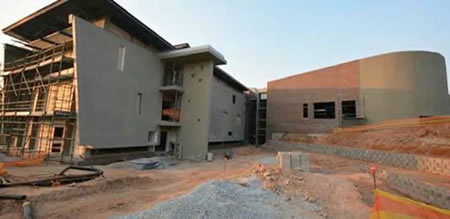 Construction at the University of Mpumalanga (UMP) is well underway with enrolment at the university expected to grow to 1 550 students, according to the Department of Higher Education and Training.
Construction at the University of Mpumalanga (UMP) is well underway with enrolment at the university expected to grow to 1 550 students, according to the Department of Higher Education and Training.
This as Deputy Minister Mduduzi Manana visited the university recently.
In February 2014, the university opened its doors in existing buildings, some of which have been refurbished, with an initial enrolment of 169 learners.
“The next phase of infrastructure development, which will begin towards the end of this year, will enable enrolments at UMP to increase to 1 550 students (500 at Siyabuswa and 1 050 at Mbombela) in the 2017 academic year,” said the department.
During the visit, the Deputy Minister was also informed that the UMP has a full Council and permanent Vice-Chancellor.
In 2014, the first undergraduate students of UMP enrolled in three qualifications - a Diploma in Hospitality Management, Bachelor of Agriculture in Agricultural Extension and Rural Resource Development, and Bachelor of Education in Foundation Phase Teaching.
Other highlights at UMP this year include the launch of a new qualification, the Diploma in Information Communication Technology, in Applications Development, and enrolled its first students into the Diploma in Agriculture in Plant Production that had previously been offered by the Lowveld College of Agriculture.
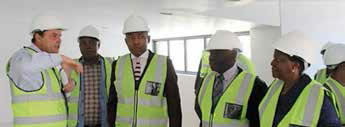 In 2015, UMP enrolled 864 students across its campuses in Mbombela and Siyabuswa.
In 2015, UMP enrolled 864 students across its campuses in Mbombela and Siyabuswa.
In addition, from October 2014, the first phase of the major new construction started. Three new multi-storey buildings are currently under construction, and will be ready for occupation early in 2016.
“These new buildings, will enable an enrolment of 1 160 at UMP in the 2016 academic year,” said the department.
At Mbombela, the facilities currently under construction, include three buildings which will be ready for use in January 2016, students residence buildings to accommodate 240 students including common amenities and study spaces; as well as a multi-purpose building with a large auditorium (250-seater), among others.
At the Siyabuswa campus, the developments include renovation undertaken in 2013 and 2014 of existing teaching facilities, six student residence buildings, a student centre, canteen and games room, among others.
At UMP Mbombela Campus, the second phase of new buildings will include the executive offices building at the entrance to the main campus with meeting rooms and university council chamber; a library and student resource centre.
Second chance for out-of-school youth and adults
Second chance for out-of-school youth and adults Estelle GreeffAngel Baloyi,16, is serious about developing herself through education. She attends a Department of Higher Education and Training (DHET) community college in her area.
Unlike other teenagers her age, Baloyi is currently doing level two at the Don’t Waste Time Nthathe Community Learning Centre in Winterveld, north of Pretoria.
The college is one of many launched by the DHET around the country to allow unskilled people and those who did not attend or finish school to further their education for free.
The community college offers a range of subjects but Baloyi’s favourite subjects are mathematics, English and Setswana.
She attends school on a daily basis together with her 12 classmates.
“Once I have completed my studies, I would like to be a nurse,” she said.
Another student who is also passionate about education is Flora Sithole, 31, who has been out of school for 10 years. She is also doing level four, which is equivalent to grade nine, also at the Don’t Waste Time Nthathe Community Learning Centre.
“While I was at home, I tried to find a decent job but I could not due to my lack of qualifications and skills. I then decided to come back to school so that I could fulfill my dream of becoming a teacher,” said Sithole, who is also the mother of a 12-year-old boy.
Sithole added that developing herself was very important because she struggled to read and write.
“When I arrived at the centre, I had serious problems with reading and writing in English as I had not read anything for years. I am learning a lot and my reading and writing skills have improved.”
She is doing six subjects, which include health care, mathematics, travel and tourism, English, life orientation and Setswana.
The Don’t Waste Time Nthathe Community Learning Centre also offers various skills such as welding, bricklaying, carpentry and computer lessons.
Thandeka Masondo Director for Community Education and Training at the DHET, said the main purpose of community colleges is to offer programmes for youth and adults who have never been to school or have some level of primary education but lower than grade nine.
“They can enroll in any of our community learning centres for adult functional literacy and numeracy programmes,” said Masondo.
She said adult functional literacy programmes start at level one, which is equivalent to grade three; then progress to level two which is equivalent to grade five; level three which is equivalent to grade seven; and level four which is equivalent to grade nine.
“At level four a learner writes a national examination which gives them a national certificate called a General Education and Training Certificate which has a National Qualification Framework level one rating and has 120 credits.
“From here, the learner can progress to a Technical Vocational Education and Training (TVET) College for further education.”
She said another alternative for South Africans wishing to further their education is studying towards getting a national senior certificate.
“This is a second chance opportunity for learners who want to register and write their senior certificate exam. They must have either failed or want to improve their Matric subjects. Students must be above 21 years and have passed grade nine, 10 and 11 or equivalent.
Masondo said all community learning centres register new students at the beginning of the academic year.
She added that prospective students can contact the community college principals who will refer them to the nearby community learning centres or their nearest DHET district office.
For information on community learning colleges, contact the DHET’s call centre on 0800 872-222 or 012 312 5368.
*Lehlohonolo Mphuthi is a communications officer with the Department of Higher Education and Training.
Compujectors for rural KZN school
Compujectors for rural KZN school Estelle GreeffLearners living in rural Msinga, KwaZulu-Natal, will now have access to new hybrid technology machines. In an effort to improve the quality of education in rural schools in the province, Premier Senzo Mchunu and Education MEC Peggy Nkonyeni handed over 20 compujectors to 20 schools in the iLembe and Umzinyathi districts.
Donated by the MTN Foundation, the machines are part computer, part projector and part interactive whiteboard. They are preloaded with education software for learners and teachers.
Speaking during the handover ceremony, which was held at Cabangokuhle High School in Msinga, Premier Mchunu said education is important to the province’s aspirations that relate to growth and development.
“The goal of our education system must be to give every child an equal opportunity to develop the knowledge, skills and attitudes needed to make a positive contribution to society. This project is a demonstration that public-private partnership can be a catalyst in driving development and facilitating access to quality education in under-serviced areas,” he said Premier.
MTN SA Foundation General Manager Kusile Mtunzi-Hairwadzi said MTN is committed toimproving the quality of education through modern technology.
Nomkhosi Sithole, a Grade 10 Learner at Cabangokuhle High School, said she had never touched a computer in her life.
“These compujectors will give us insight into how a computer works,” she said.
Premier Mchunu encouraged learners to study hard in order to be successful in life. He also encouraged the community to take part in promoting the culture of teaching and learning.
“We make a strong appeal to learners, teachers and parents to own and safeguard the compujectors given to you today,” he said.
Make the right career choice
Make the right career choice Estelle GreeffIt’s that time of the year when many young people are starting to think about their future and careers that they would like to follow.
If you want advice on choosing or changing a career, the Department of Higher Education and Training’s Career Development Services (CDS) unit is the right place for you.
The unit was officially launched in DHET in October 2014, the unit aims to give people of all ages, especially primary and high school learners, advice on how to choose a career.
“We are of the view that people need career development advice throughout their lives, even at primary school level when you need to be exposed to career information to give you an understanding of the choices you will have to make when you are older,” explained Letshego Mokeki, Project Manager of Career Development Services.
The unit not only targets primary and secondary school learners, but also people who would like to change careers.
“Some people get to 40 and realise that there are things they’ve always wanted to do and with the experience they’ve accumulated over the years, they can change careers. Our unit gives such people advice on the type of career they can choose.
“In fact, we even target people who are retrenched and would like to consider new career options.”
Since the service was initially started in 2010, the unit has played an important role in helping people choose their careers. Mokeki said initially the unit was not well received, but as time went on, it picked up.
“Like any new institution, when we started things were a bit slow, but in the past few years we’ve gained momentum.”
He adds that the unit reaches a substantial number of people through a career service helpline, school visits, exhibitions, open days and FET colleges and outreach events.
Getting started: Choosing a career
Decisions about choosing a career are important and must be taken with care and consideration.
There are a few things you need to consider when making a career choice:
- Self-knowledge: People are different and look for different things in jobs. For example, there are people who are artistic and creative and will always look for an environment that encourages creativity.
- Values and interests: You must know your values and interests. If you have an interest in money, you might want to choose a career in accounting; if you like helping people, you might want to choose a career as a social worker.
- The world of work: In addition to knowing yourself, you need to know the world of work and the career opportunities that exists in that world. This means you need to do basic research into the career that interests you.
For more information:
Visit the National Career Advice Portal: http://www.careerhelp.org.za
The Career Development Services can be reached in the following ways:
- Helpline telephone number: 086 999 0123
- Helpline SMS/text message: 072 204 5056
- Helpline fax number: 086 458 8172
- Email: careerhelp@dhet.gov.za
Graduates help teach South Africa
Graduates help teach South Africa Estelle GreeffFor two young men, the idea of climbing the corporate ladder after graduating held little appeal.
Instead they opted to give back to society by becoming teachers at rural schools in KwaZulu-Natal.
Solomzi Joki, 23, holds a Bachelor of Science degree specialising in chemistry, while Fortune Sibiya, 22, also has a science degree specialising in applied mathematics. Both obtained their qualifications from the University of KwaZulu-Natal.
The youngsters are part of a programme run by an organisation called Teach SA, which places university graduates in classrooms in disadvantaged schools for two years. The graduates teach mathematics, physical science and languages.
According to Richard Masemola, Executive Director and co-founder of Teach South Africa, the organisation aims to address the skills shortage in teaching and improve the quality of education across the country.
Teaching mathematics and physical science
Joki is a physical science teacher at eMthulasizwe High School in the rural village of KwaMyeki in Mtubatuba in northern KwaZulu-Natal.
He teaches physical science, mathematics, life science and computer literacy to Grade 8 and 11 learners.
He also conducts tutorials for matrics and does revision to help prepare them for exams.
Joki said he decided to give back to the community by teaching because he understands the pain of being a high school learner and not having a life science educator.
“I wanted to teach science because there aren’t enough science educators in the country. When I was in Grade 11, my life science studies suffered because we did not have a teacher.”
For Joki, being an educator is also about sharing his knowledge with his pupils.
“I thought I could give learners a different and exciting version of science, especially because there are misconceptions that physical science and mathematics are difficult.”
Sibiya, who teaches Grade 12 mathematics at Asiphikelele High School in Mtubatuba, decided to teach because of his passion for mathematics and his ability to simplify mathematics problems.
“This is an opportunity for me to help young people who are not too fond of mathematics and try to change their mindset about the subject. I also wanted to see more young people such as myself matriculating and pursuing careers in science and maths-related fields.
“Another thing is that there is a serious shortage of mathematics teachers and I want to be the part of the solution.”
Both Joki and Sibiya said they love what they do because they are learning about young people.
“I enjoy teaching young people. They are so alive, they enjoy being at school and they still dream about endless opportunities even though they are not exposed to much,” said Joki.
They add that being an educator is not child’s play.
“The amount of preparation for lessons and the workload is heavy. Being in this programme has taught me to respect educators,” adds Joki.
Addressing the teacher shortage
The Department of Basic Education (DBE), through the Funza Lushaka Bursary Programme, is working hard to address the shortage of teachers in South Africa.
According to Education Management Information Systems lists compiled by the DBE, in 2014 there were over 12 million learners in 24 060 public schools being taught by just over 390 000 educators.
Funza Lushaka aims to attract academically deserving and suitable South African students to become competent teachers in identified priority, scarce skill subjects and phases.
Basic education spokesperson Elijah Mhlanga said organisations such as Teach South Africa assist in supporting the aims of the department in ensuring that teaching happens and that relevant support services are made available.
“This is in accordance with the department’s ambitions of achieving quality learning and teaching.”
Mhlanga said the DBE received more than 70 000 applications during the 2014/2015 application period for the bursary scheme.
Bursaries were awarded to 13 972 applicants in 2015.
“The department has also developed the National Recruitment Database which registers any professionally qualified South African educator seeking employment.”
The database is easily accessible from anywhere in the country. Principals and School Governing Bodies are able to quickly identify appropriately qualified educators who meet the criteria for the post they are trying to fill.
As for Joki and Sibiya, the future looks bright for them as they plan to stay in education for a while.
“I am currently enrolled for a Post Graduate Certificate in Education at Unisa. It’s part of our contract at Teach South Africa that we obtain this. The South African Council for Educators gives us a licence to teach for one year while obtaining this certificate.
“I want to stay in teaching for another two years once my contract expires. After that, I would like to do my honours in pharmacology.”
Sibiya said he wants to do his honours in Computing and Financial Management because he dreams of being a qualitative analyst one day.
For more information on:
Teach South Africa, call 082 383 6687 or visit: www.teachsouthafrica.org
Funza Lushaka, call 0800 202 933 or visit: www.funzalushaka.doe.gov.za
Know your Minister
Know your Minister Estelle GreeffOver the next few months Vuk’uzenzele will bring you short profiles of Ministers in our Cabinet. This is a chance for you to know your leaders and learn more about what they do.
Minister Jeff Radebe
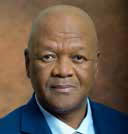 Minister Jeff Radebe is the second minister of the Department of Planning Monitoring and Evaluation, based in The Presidency.
Minister Jeff Radebe is the second minister of the Department of Planning Monitoring and Evaluation, based in The Presidency.
He took over from the late Collins Chabane who was the first minister of the department.
About the department
The department is responsible for facilitating, influencing and supporting effective planning in government.
It also monitors and evaluates government’s programmes. The department is also responsible for measuring the quality of management practices across government. It also manages a programme called Citizen Based Monitoring. This is a program that focuses on citizen’s experience of government.
About Minister Radebe
Before occupying his current position, Minister Radebe served as minister in a range of portfolios.
His first position as minister was after the 1994 democratic elections where he served as Minister of Public Works until 1999.
From June 1999 to April 2004, he served as Minister of Public Enterprises and he went to become the Minister of Transport between 2004 and 2009.
After serving the transport portfolio, he went on to become the Minister of Justice and Constitutional Development where he served between 2009 and 2014 before he took over as Minister in the Presidency for Planning, Monitoring and Evaluation.
The Minister holds a B. Juris degree from the University of Zululand obtained in 1976, LLM in International Law from Leipzig University, Germany obtained in 1981 and studied at the Lenin International School, Moscow in 1985.
Minister Nomvula Mokonyane
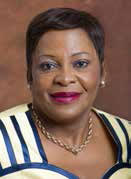 Minister Nomvula Mokonyane is responsible for the Department of Water and Sanitation. This department was once known as the Department of Water Affairs.
Minister Nomvula Mokonyane is responsible for the Department of Water and Sanitation. This department was once known as the Department of Water Affairs.
About the department
This department is responsible for managing the water resources of the country and implementation of policy governing this sector.
About Minister Mokonyane
Minister Mokonyane became the minister of the department after the general elections last year.
She brought a wealth of experience to her position as minister. Minister Mokonyane served in the Gauteng Legislature from 1994 in various portfolio committees before she was appointed MEC of Agriculture, Conservation and Environment in 1996.
After leading the Gauteng Department of Agriculture, Conservation and Environment, she was appointed for MEC for Safety and Liaison from 1999 to 2004.
Between 2004 and 2009, she was in charge of the Department of Housing until she was appointed to being the Premier of Gauteng in 2009. She has been the Premier of Gauteng from 2009 until 2014 when she assumed her current role as Minister of Water and Sanitation. She has received training in Local Government and Planning Management and Community Development in Sweden.
She completed a certificate course in Emerging Economics at the Wharton Business School at Pennsylvania University, and studied leadership and governance at Harvard University in the USA.
Break the silence against child abuse
Break the silence against child abuse Estelle GreeffAs the country commemorates 16 Days of Activism for No Violence Against Women and Children, the South African Police Service (SAPS) has called on communities to break the silence and fight child abuse.
“If you suspect any child abuse is happening, don’t keep quiet, report it to your nearest police station or the various call centres that have been set up,” said Major-General Yvonne Botsheleng, Head of the Family Violence, Child Protection and Sexual Offences (FCS) Unit at SAPS.
She said although the FCS Unit is committed to ensuring the safety of children, parents, family members, teachers and community leaders must play a role in protecting children from abuse.
“It takes a village to raise a child – it is the whole community’s responsibility to take ownership of ensuring the safety of our children,” said Maj-Gen Botsheleng.
The 16 Days of Activism for No Violence Against Women and Children is an international awareness-raising campaign.
It is commemorated every year from 25 November, which is International Day for the Elimination of Violence Against Women, to 10 December, known as International Human Rights Day. The period also includes Universal Children’s Day and World Aids Day.
The Department of Women has moved away from event-driven 16 Days of Activism on no violence against women and children to a programme that must happen 365 days. The department launched #365 days where members of society including men are encouraged to join hands with government against this scourge with the theme “Count me in”.
Fight crimes against children
Maj-Gen Botsheleng highlighted that the FCS Unit has improved its services to ensure that it can fight crimes against children. This has resulted in a decrease in the number of reported cases and a strong conviction record against those who commit child abuse.
According to the official crime statistics, crimes against children have decreased year-on-year from 48 718 reported cases in the 2012/13 financial year to 45 230 in the 2013/14 financial year. The conviction rate is up to 75 per cent.
She added that the SAPS could not fight the violence against women and children alone but need the support of the community.
Re-establishment of the FCS unit making a difference
According to Maj-Gen Botsheleng, the re-establishment of the FCS Unit in 2010 has helped secured over 1 832 life sentences for crimes against women and children.
The FCS Unit was re-launched in 2010 after being absorbed into the greater police service in 2006. Since then it has doubled its resources and now has 176 units and close to 2 500 members nationwide.
In addition, the FCS employs a network of highly-skilled forensic social workers to help with the assessment of abused children and the compilation of court reports, as well as for providing expert testimony in court.
The FCS is involved in the policing of sexual offences against children, person-directed crimes where the family is involved, illegal removal of children under 12 and electronic media-facilitated crime. Two current areas of particular concern for the FCS are child pornography and sexual offences.
“Over half of all crimes against children that are reported involve sexual offences. This is being intensified by the increase of electronic media for the transmission of child pornography.
“When it comes to policing child trafficking, the SAPS has a highly specialised desk operating under the Hawks – the Directorate for Priority Crime Investigation (DPCI).”
Some of the signs that a child is being sexually abused
- Explicit sexual behaviour
- Change in behaviour
- Anger, aggression
- Depression, suicide attempts
- Withdrawal or regression
- Problems with urination
- A drop in their school performance
- Vagina: Discharge, trauma, bleeding, foreign body
- Discomfort when walking or sitting.
Tips for keeping your children safe
Maj-Gen Botsheleng gave the following advice on how to safeguard children:
- Always be aware of your children’s whereabouts and ensure there is somebody looking after them at all times.
- Keep a close eye on your child’s cellphone, internet usage and with whom they’re communicating.
- Do a background check on any child minders (nannies) that you employ and any daycare or crèche that you send your children to.
- If you can’t fetch your children from school, make sure the teachers are aware of who will be collecting them.
- If abuse is happening within the family unit, don’t ignore it or try and manage it internally. Reach out for professional help from the SAPS or the various child protection institutions.
- Children must be honest with their parent/s so that they can be helped quickly or abuse can be picked up easily.
- Parents must know and understand their children, talk openly to them about abuse and ensure their protection.
To report any suspected child abuse, neglect or exploitation, please contact any of the following hotlines (you can remain anonymous):
- SMS Crime Line: 32211
- Department of Social Development 24-hour Command Centre: 0800 428 428 (toll-free) – callers can speak to a social worker for assistance and counselling
- Callers can also request a social worker from the Command Centre to contact them by dialing *120*7867# (free) from any cell phone
- Child Welfare South Africa: 0861 424453 / 011 452-4110 / email:info@childwelfaresa.org.za
- SAPS Crime Stop: 08600 10 111
Domestic violence: Find your voice
Domestic violence: Find your voice Estelle GreeffMany South Africans Domestic still view violence as a private matter but this is a criminal offence, which is punishable by law. Government, through various Departments, has introduced various pieces of legislation to reduce Domestic Violence.
What is Domestic Violence?
According to the Domestic Violence Act No. 116 of 1998 it is:
- any form of abuse which includes physical, sexual, emotional, psychological or economic harassment
- damage to property
- stalking
- entry into a person's property without their consent
- any other abusive or controlling behaviour where such a conduct causes harm or may cause harm to your health, safety, or well being
Support for victims of abuse
There are various specialised/dedicated victim support services and one-stop centres such as:
-
Thuthuzela Care Centres
These centres are mainly based within health facilities that aim to reduce secondary victimisation, improve conviction rates and reduce the cycle time for finalisation of cases. -
Khuseleka One-Stop Centres
These centre provide services for women and children victims of violence such as trauma counselling and psychosocial support, health care, police services, legal assistance, shelter services to name a few. The centres are open 24 hours for service. - SAPS Family Violence, Child Protection and Sexual Offences Units (FCS). The FCS units fight sexual offences against children, person-directed crimes (where the family is involved), illegal removal of children under 12 and electronic media facilitated crime.
For help call: SAPS Crime Stop: 08600 10 111 or Department of Social Development Command Centre: 0800 428 428
If you are being abused you have the right to apply for a protection order at the nearest police station or magistrate's court or lay a criminal charge at the police station and apply for a protection order. A domestic violence protection order is a document issued by the court, which protects the victim from the abuser.
How to get a protection order in terms of the Domestic Violence Act, 1998 (Act no. 116 of 1998)
Who can apply for a protection order?
Any person who has been in a domestic relationship with the respondent.
When is there a domestic relationship between the complainant and the respondent?
Where they are or were married to one another; Where they live or lived together in a relationship in the nature of a marriage, though they are not; Share parental responsibility over a child; Engaged, dating or customary relationship; Blood relatives or related by affinity or adoption; Share or recently shared same residence.
Against whom can a protection order be obtained?
Any person who is or has been in a domestic relationship with a complainant and who has committed or allegedly committed an act of domestic violence against the complainant.
Who has the duty to inform the complainant of their rights in terms of the DVA?
A member of the South African Police Service. (Section 2) Form 1 Regulation 2; Notice to complainant in a case of domestic violence.
Where can a complainant apply for a protection order?
At any Magistrates Court or Family Court established in terms of an Act of Parliament. (Section 4(1) read with section 1 (Section 12) Any court within the area were the complainant permanently resides, carries on business or is employed. Where the respondent resides, carries on business or is employed or any court were the action arose.
Can a complainant be represented by a lawyer when applying for a protection order?
- Yes
- Section 14
With whom must the application for a protection order be lodged at the Magistrates court?
- The Clerk of the court.
- Section 4(7)
Can a minor apply for a protection order without the assistance of a guardian?
- Yes.
- Section 4(4)
When is it allowed for an application for a protection order to be brought outside ordinary court hours or a day not an ordinary court day?
If the court is satisfied that the complainant will suffer undue hardship if the application is not dealt with immediately. Section 4(5)
What documents must be submitted by the complainant when applying for a protection order?
- An application substantially corresponding to Form 2 of Regulation 4 of the DVA regulations ; application for protection order
- Supporting affidavits by persons who have knowledge of the matter.
- Sections 4(6) and (7).
What happens if the court does not issue the interim protection order?
Section 5(4) The court must direct the clerk of the court to cause certified copies of the application and any supporting affidavits to be served on the respondent in the prescribed manner together with the prescribed notice [Form 5 Regulation 7]; calling on the respondent to show cause why a protection order should not be issued.
Issuing of final protection order
Section 6(1) A final protection order will be issued if the respondent does not appear on the return date as set out in the interim protection order or if the respondent does not appear on the return date as set out in the notice when an interim protection order was not granted. Section 6(2) If the respondent appears on the return date as set out in the interim protection order or notice and opposes the issuing of a protection order the court will then proceed to hear the matter A protection order issued by the court must be in the prescribed form either in accordance with Form 6 Regulation 8; or Form 7 Regulation 8.
What happens after a protection order is issued?
Section 6(6) The clerk of the court must forward certified copies of the protection order and warrant of arrest to the police station of the complainants choice.
Issuing of the warrant of arrest
Section 8(1)(a) The warrant of arrest must be authorised and issued in accordance with Form 8 Regulation 9. Whenever a court issues a protection order the court must make an order authorising the issue of a warrant of arrest. The execution of the warrant of arrest is suspended subject to compliance with any prohibition, condition, obligation or order imposed by the court.
Jobs: Sport and Recreation South Africa
Jobs: Sport and Recreation South Africa Estelle GreeffDirector: School Sport
SALARY LEVEL AND NOTCH 13: R864 177. 00 pa (To be structured in terms of the Senior Management Services Handbook )
REFERENCE: 01/10/2015
Deputy Director: School Sport
SALARY LEVEL AND NOTCH 11: R569 538.00 pa (To be structured in terms of the Middle Management Services Guidelines )
REFERENCE: 02/10/2015
Deputy Director: Expenditure Management
SALARY LEVEL AND NOTCH 11: R569 538.00 pa (To be structured in terms of the Middle Management Services Guidelines )
REFERENCE: 03/10/2015
Senior Sport and Recreation Co-ordinator: Club Development
SALARY LEVEL AND NOTCH 9: R289 761.00 pa pa
REFERENCE: 04/10/2015
Senior Sport and Recreation Co-ordinator: Competitive Programmes
SALARY LEVEL AND NOTCH 9: R289 761.00 pa
REFERENCE: 05/10/2015
State Accountant: Budgeting and Reporting
SALARY LEVEL AND NOTCH 8: R243 747.00 pa
REFERENCE: 06/10/2015
Sport and Recreation Co-ordinator: International Relations
SALARY LEVEL AND NOTCH 7: R196 278.00 pa
REFERENCE: 07/10/2015
PA to Chief Director: Communication (5 year contract, linked to the term of the Chief Director: Communication)
SALARY LEVEL AND NOTCH 8: R196 278.00 pa
REFERENCE: 08/10/2015
Secretary (x2 positions) Director: Management and Administration and Director: Policy and Research
SALARY LEVEL AND NOTCH 5: R132 399.00 pa
REFERENCE: 09/10/2015
Accounting Clerk: Budgeting and Reporting
SALARY LEVEL AND NOTCH 5: R132 399.00 pa
REFERENCE: 10/10/2015
Interested and qualifying applicants may access our website at www.srsa.gov.za for further particulars of each position.
Please Note: All candidates must be South African Citizens or Permanent Residents. All positions are based in Pretoria. Short listed candidates will be vetted and the appointments will be subject to positive vetting results. We encourage all applicants to declare any criminal and or negative credits records.
Sport and Recreation South Africa is an equal opportunity and affirmative action employer. It is our intention to promote representivity in the Department through the filling of posts and we reserve the right not to fill a position.
Applications must be submitted on Form Z.83, obtainable from any Public Service department and should be accompanied by a comprehensive CV indicating three reference persons with the following information: name and contact numbers as well as an indication of the capacity in which the reference is known to the candidate, certified copies of qualifications as well as certified copy of an Identity Document. Failure to submit all the required documents will lead to your application not being considered. Correspondence will be limited to successful candidates only. Short-listed candidates must avail themselves for an interview on a date, time at the venue to be determined by Sport and Recreation South Africa.
Please forward your application, quoting the relevant reference number, to the Human Resource Directorate, Sport and Recreation South Africa, Private Bag X896, Pretoria 0001. No faxed or e-mailed applications will be accepted. If you have not been contacted within three months of the closing date of this advertisement, please accept that your application was unsuccessful. For hand deliveries: 66 Regent Place, Cnr Queen and Madiba Streets, Pretoria Each application must be accompanied by the relevant documentation as indicated above.
Closing date: 13 November @16:00
Invitation to bid - Public Enterprises
Invitation to bid - Public Enterprises Estelle Greeff BID NO: DPE 20/2015-2016
BID NO: DPE 20/2015-2016
BID CLOSING DATE AND TIME: 20 NOVEMBER 2015
The Department of Public Enterprise invites service providers to submit a proposal to assist the department to conduct macro-economic impact assessment of State Owned Companies under its portfolio as well as the development of an economic impact assessment model.
A copy of the bid document will also be available on the department’s website: www.dpe.gov.za or a request for a copy via email can be sent to: Zandarine.@dpe.gov.za.
For technical enquiries contact: Ntsiki Mbono or Dzingai Chapfuwa at tel: (012) 431 1207/1065, or email: ntsiki.mbona@dpe.
Jobs: Justice and Constitutional Development - Nov '15
Jobs: Justice and Constitutional Development - Nov '15 Estelle Greeff CHIEF DIRECTOR: RESEARCH
CHIEF DIRECTOR: RESEARCH
REFERENCE: 15/337/CLO
PACKAGE: R1 042 500 – R1 246 449 per annum (All inclusive). The successful candidate will be required to sign a performance agreement.
REQUIREMENTS: An LLB Degree or 4 year legal qualification at NQF Level 7; A post graduate in law will be an added advantage; Minimum of 10 years litigation experience of which 5 years should be at Senior Management Level; Extensive experience in research environment; Knowledge of legislations, regulations and departmental policies; Knowledge on protocols and cabinet decisions and processes; A valid drivers licence.
ENQUIRIES: Mr. E. Seerane (012) 357 1780
DIRECTOR: THIRD PARTY FUNDS (OTHER): ACCOUNTING (FIXED-TERM CONTRACT ENDING JULY 2017)
REFERENCE: 15/324/CFO
PACKAGE: R864 177 – R1 017 972 per annum. The successful candidate will be required to sign a performance agreement.
REQUIREMENTS: A Degree in Financial Management/or Public Administration at NQF level 7; A minimum of six (6) years relevant experience in a finance/administration environment of which a minimum of 5 years experience should be at middle/senior managerial level; Thorough knowledge and experience in GRAP disclosure requirements, accrual accounting as well as modified cash and cash accounting; Knowledge of Public Finance Management Act (PFMA) and National Treasury Regulations; Experience in Third Party Funds administration at National, Regional or Court level; Knowledge of GRAP/GAAP, accrual accounting as well as modified cash and cash accounting; Working knowledge of SAP; Certified Chartered Accountant; A valid driver’s licence. The following will serve as added advantage: Knowledge of the Department of Justice and Constitutional Development and it’s Third Party Funds (TPF) functions and services; Experience on the Justice Deposit Account System (JDAS) and/or State Attorney System (SAS)
ENQUIRIES: Ms. S Bezuidenhout (012) 315 1090
PRINCIPAL LEGAL ADMINISTRATION OFFICER
REFERENCE: 171/15/WC
PACKAGE: R864 177 – R 1 017 972 per annum (All inclusive). The successful candidate will be required to sign a performance agreement
REQUIREMENTS: LLB or B Proc. Degree. At least six (6) to ten (10) years legal experience of which six (6) years’ must be at middle management level; Sound knowledge of the South African Legal System; A valid driver’s licence.
ENQUIRIES: Mr N Luddy Tel. 021 462 5471
DEPUTY DIRECTOR: LEARNING AND DEVELOPMENT
REFERENCE: 2015 /130 /MP
PACKAGE: R569 538 – 670 890 per annum (All Inclusive). The successful candidate will be required to sign a performance agreement.
REQUIREMENTS: A three year Bachelor’s Degree in Human Resource; Development or equivalent qualifications; Minimum 3 years at managerial level; Knowledge of the National Skills Development Strategy; Legislation impacting on skills development and Regulations on Education and Training bodies and structures that deal with training and development; A Valid drivers’ licence.
ENQUIRIES: Ms D C M Haasbroek (013) 753 9300/19
DEPUTY DIRECTOR: TECHNOLOGY ARCHITECTURE: (2 POSTS) (CONTRACT APPOINTMENT ENDING 30 SEPTEMBER 2018) (RE-ADVERTISEMENT) PREVIOUS APPLICANTS ARE ENCOURAGED TO RE-APPLY
REFERENCE: 15/334/ISM
PACKAGE: R569 538 – R670 890 per annum. The successful candidate will be required to sign a performance agreement.
REQUIREMENTS: A National Diploma/Degree in Information Systems/Technology/Computer Science or equivalent (NQF 6); Three years experience in the information Systems, LAN and WAN environment, with specific focus on: Server and Server Virtualization Infrastructure: Storage Infrastructure; IT networking, Database; Knowledge of TOGAF framework (Certification will be an added advantage); Experience working with Microsoft platforms and technologies (Certification as Microsoft professional ie. MCSE, MCITP, etc will be an added advantage)
ENQUIRIES: Ms S. Bezuidenhout (012) 315 - 1090
COURT MANAGER (2 POSTS)
REFERENCE: 2015/132/MP: Mpumalanga; 2015/229/GP: Gauteng
SALARY: R361 659 – R3426 009 per annum. The successful candidate will be required to sign a performance agreement.
REQUIREMENTS: A 3 year qualification in Administration and/or a National Diploma in Services Management (NQF level 5) plus the module in Case Flow Management or equivalent qualification; 3-years’ managerial or supervisory experience; A valid code EB driver’s licence; The following will serve as strong recommendations: Knowledge of and experience in office and district administration; Knowledge of financial management and the PFMA.
ENQUIRIES: NELSPRUIT: Mr MH Hlophe (013) 753 9300/07; GAUTENG: Ms. D Mngomezulu (011) 332 9000
ASSISTANT DIRECTOR, COURT INTERMEDIARIES (2 POSTS)
REFERENCE: 080/15NC
SALARY: R289 761 – R341 313 per annum. The successful candidate will be required to sign a performance agreement.
REQUIREMENTS: Three year Bachelor Degree/ National Diploma academic qualification in one of the following fields; teaching, social work/ family counseling, child care and youth development, pediatrics, psychiatry, clinical counseling, educational psychologist; Applicants must be duly registered with the relevant professional/ scientific organization/body in their field of specialization; Five (5) years’ experience in intermediary services of which three (3) years should be at supervisory level; Experience in working with different types of disabilities, exposure to court procedure, court etiquette, legal terms and terminology and functions of courts will be added advantages; Knowledge of the relevant legal and regulatory framework (Constitution of RSA, 1996; Criminal Procedure Act, 1977 (Act No 51 of 1977), particularly sections 153, 158 and 170A of the Act; Criminal Law (Sexual Offences and Related Matters) Amendment Act, 2007 (Act No 32 of 2007); Children’s Act, 2005 (Act No 38 of 2005); Domestic Violence Act (Act No 116 of 1998); Be fluent in the predominant language(s) of the jurisdictional area of the court.
ENQUIRIES: Mr. L. Swartz (053) 802 1300
ASSISTANT STATE ATTORNEY, LP3-LP4 (9 POSTS)
REFERENCE: 15/321/SA: PRETORIA (6 POSTS); 15/322/SA: DURBAN (03 POSTS)
SALARY: R229 773 – R657 924. (Salary in accordance with OSD determination). The successful candidate will be required to sign a performance agreement.
REQUIREMENTS: An LLB or 4 year recognized legal qualification; Admission as an Attorney; At least 2 years appropriate post legal/litigation experience; Right of appearance in the High Court will be an added advantage; A valid driver’s licence.
ENQUIRIES: Ms. Khanyi Ngomani (012) 357 8661
LEGAL ADMINISTRATION OFFICER (2 YEARS CONTRACT APPOINTMENT): DOMESTIC VIOLENCE
REFERENCE: 15/329/CS
NOTE: THIS IS A RE-ADVERTISEMENT POST, CANDIDATES WHO PREVIOUSLY APPLIED ARE ENCOURAGED TO RE-APPLY AS THE POST REQUIREMENTS HAVE CHANGED
SALARY: R195 945 – R708 765 per annum. (Salary will be accordance with OSD determination). The successful candidate will be required to sign a performance agreement.
REQUIREMENTS: An LLB or four year recognized legal qualification; At least 2 years appropriate post qualification legal experience; A driver’s licence; The following will serve as added advantages: Knowledge of Government Policies; Knowledge of Public Finance Management Act and Treasury Regulations; and Criminal Justice System.
ENQUIRIES: Mr T Rangwato (012) 315 1456
LEGAL ADMINISTRATION OFFICER: RESTORATIVE JUSTICE (2 YEAR CONTRACT APPOINTMENT)
REFERENCE: 15/330/CS
NOTE: THIS IS A RE-ADVERTISEMENT POST, CANDIDATES WHO PREVIOUSLY APPLIED ARE ENCOURAGED TO RE-APPLY AS THE POST REQUIREMENTS HAVE CHANGED
SALARY: R195 945 – R708 765 per annum. (Salary will be accordance with OSD determination). The successful candidate will be required to sign a performance agreement.
REQUIREMENTS: An LLB or four year recognized legal qualification; At least 2 years appropriate post qualification legal experience;; A driver’s licence; The following will serve as added advantages: Knowledge of Government Policies; Knowledge of Public Finance Management Act and Treasury Regulations; and Criminal Justice System.
ENQUIRIES: Mr T Rangwato (012) 315 1456
CLOSING DATE IS 16 NOVEMBER 2015
NOTE: Interested applicants may visit the following website: www.justice.gov.za or www.dpsa.gov.za to view the full job specification of the above positions. Applications must be submitted on Form Z83, obtainable from any Public Service Department or on the internet at www.gov.za. A Z83 & CV must be accompanied by original certified copies of qualifications and identity document. A driver’s licence must be attached if indicated as a requirement. A SAQA evaluation report must accompany foreign qualifications. Applications that do not comply with the above mentioned requirements will not be considered.
All shortlisted candidates for SMS posts will be subjected to a technical exercise that intends to test relevant technical elements of the job, the logistics of which will be communicated. Following the interview and technical exercise, the selection panel will recommend candidates to attend a generic managerial competency assessment (in compliance with the DPSA Directive on the implementation of competency based assessments). The competency assessment will be testing generic managerial competencies using the mandated DPSA SMS competency assessment tools. The successful candidate will sign an annual performance agreement, complete a financial disclosure form and also be required to undergo a security clearance. If the candidate is applying for an OSD post, certificates of service must be attached to the CV. Shortlisted candidates will be subjected to a personnel vetting process. Correspondence will be limited to short-listed candidates only. If you do not hear from us within 3 months of this advertisement, please accept that your application has been unsuccessful. The department reserves the right not to fill these positions.
The DOJ&CD is an equal opportunity employer. In the filling of vacant posts the objectives of section 195 (1) (i) of the Constitution of South Africa, 1996 (Act No: 108 of 1996), the Employment Equity imperatives as defined by the Employment Equity Act, 1998 (Act No: 55 of 1998) and relevant Human Resources policies of the Department will be taken into consideration. Women and people with disabilities are encouraged to apply and preference will be given to the EE Target.
Sport transformation to help youth reach top
Sport transformation to help youth reach top Estelle GreeffSport, arts and culture, youth
Many South Africans passionately want transformation in sport in South Africa. Citizens want equal access to facilities, funding, coaching and to compete at every level.
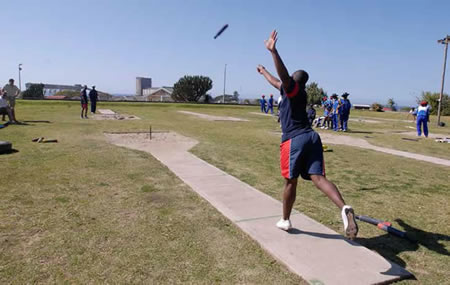 Government shares this passion and is working to achieve change.
Government shares this passion and is working to achieve change.
“Transformation is about equity and access. … those who are historically disadvantaged must also have access,” said Minister of Sport and Recreation, Fikile Mbalula, at a New Age Breakfast Briefing recently.
Dr Willie Basson of the Eminent Persons Group (EPG) and Gideon Sam, president of the South African Sports Confederation and Olympic Committee (Sascoc), participated in the discussion.
Dr Basson said 20 years ago, transformation was a moral issue and many sports people were divided because they disagreed with the use of quotas.
“The bulk of sports people have accepted morally we have to change. The strategic reason has been overlooked: 84 per cent of South Africans are black African and 16 per cent are white, Indian and coloured. The bulk of the population must be focused on to carry the country into the future.
“Nothing happened in black schools and amongst black Africans. We have set ourselves back in terms of exploiting the major source of human capital,” said Dr Basson.
Because monitoring is essential for transformation to progress, the minister decided to appoint an independent group to monitor progress in achieving targets.
It is a two-step approach: create equal access and develop a competitive sport system. The EPG oversees this and reports to the minister.
“The emphasis is on school sport as that is where sportsmen come from.
“Our plan is to diversify. Not everybody loves football and cricket. Young kids like basketball and netball. If we diversify, we give them opportunities, we give them options. Boxing is back,” said Minister Mbalula.
In support of boxing development, the minister presented a R10 million cheque to Boxing South Africa and the South African National Boxing Organisation at the briefing.
Dr Basson said school level transformation is essential.
“You can’t have transformed teams at the top unless there are building blocks at the bottom and there is access. The longer we take to do this the more talent we will lose.”
Dr Somadoda Fikeni, EPG chairperson, said interdepartmental coordination is important.
“If Basic Education doesn’t introduce sport in schools it won’t be developed at the lower levels,” he said.
“All federations get allocations from government but these are enough for administration only,” said the minister, who thanked corporate South Africa for its support.
The minister said he was campaigning to take over the 15 per cent municipal infrastructure grant because municipalities were not developing sports infrastructure. He wants the municipal grants - about R2 billion a year - to be used to roll out facilities at municipal level.
The minister suggested sports facilities lower their tariffs so that soccer clubs, community development clubs and people in townships can use facilities free if necessary.
Minister Mbalula said much work was being done regarding up-and-coming small sports such as a partnership with the army to develop emerging boxers to get them ready for the Olympics.
Sam said “the federations have embraced change. Everything is in place; all we need is to spend time dealing with it in remote areas.”
More support for eThekwini youth
More support for eThekwini youth Estelle GreeffSport, arts and culture, youth
Life will no longer be the same for scores of young people in the eThekwini Municipality following the establishment of the Youth Development Office.
 This is one of the municipality’s programmes aimed at ensuring that young people participate in the mainstream economy.
This is one of the municipality’s programmes aimed at ensuring that young people participate in the mainstream economy.
Speaking to Vuk’uzenzele newly appointed Youth Office Manager Mndeni Mkhize said the aim of the Youth Development Office is to help young people with issues ranging from finance, business administration and business proposals among other things. Mkhize said their approach is aimed at enhancing the control the youth have over their lives.
The Youth Development Office will help with skills development and encourage the development of a culture of entrepreneurship for young people in the area.
“The establishment of the office will at the same time help us to create our database for youth business owners. We didn’t know how many youth businesses are within our municipality and what services do they offer as the information was scattered. But through this office we will now be able to have our own young entrepreneurs’ database,” said Mkhize.
He added that the office would also help the municipality identify challenges young entrepreneurs face and work with them to find solutions.
“We are saying to them ‘this is where we’re going to challenge you and these are the channels whereby there are opportunities’,” he said.
Mkhize added that the office will not only focus on those who want to start businesses but will also cater for those who want to further their studies.
“The eThekwini Mayor James Nxumalo recently launched [the] Student Financial Aid Relief Fund which offers bursaries to pupils who come from disadvantaged backgrounds. Last year alone we managed to help 200 students and hope to double the number this year,” he said.
Mkhize urged young people to come up with ideas that will help to transform their lives.
For more information on the eThekwini Youth Development office you can contact 031 311 2070 or email: mndeni.mkhize@durban.gov.za
NYDA empowers North West youth
NYDA empowers North West youth Estelle GreeffSport, arts and culture, youth
The National Youth Development Agency (NYDA) in partnership with the Dr Ruth Segomotsi Mompati District Municipality in the North West recently launched a Youth Build programme involving 100 unemployed rural youth from Taung and surrounding villages who are being trained in plumbing and welding.
“This programme is another example of the real work carried out by the NYDA in rural areas with life-changing impact for the participants. As the NYDA, there is nothing more fulfilling than witnessing young people involved in building a better South Africa for all.
“Our YouthBuild volunteers are embarking on possibly one of the greatest skills transfer programmes of their lives for what they are about to learn is practical, real-world expertise. This programme represents the very first of its kind in this community,” said Yershen Pillay, NYDA Executive Chairperson.
The youth will start short skills development training using the YouthBuild programme model to learn technical skills that they can use to empower themselves and generate income for themselves and their families.
“I joined the NYDA YouthBuild programme to learn the plumbing trade, which I was first exposed to in primary school where artisan training was part of our curriculum.
“I have already started a plumbing cooperative with other young people from my community so when I heard about the YouthBuild programme in Taung I knew I had to be a part of it,” said a volunteer, Victoria Mohale from Leshobo Village, about 15km from Taung.
Mohale completed matric in 2011 and has been unemployed since then but has been keeping busy with various volunteer opportunities to gain work experience and skills.
The training identified for the project will be an accredited construction skills programme at NQF level 3 and it will be in the plumbing and welding trades as identified by the Municipality. For more information call the National Youth Development Agency on: 0800 52 52 52

